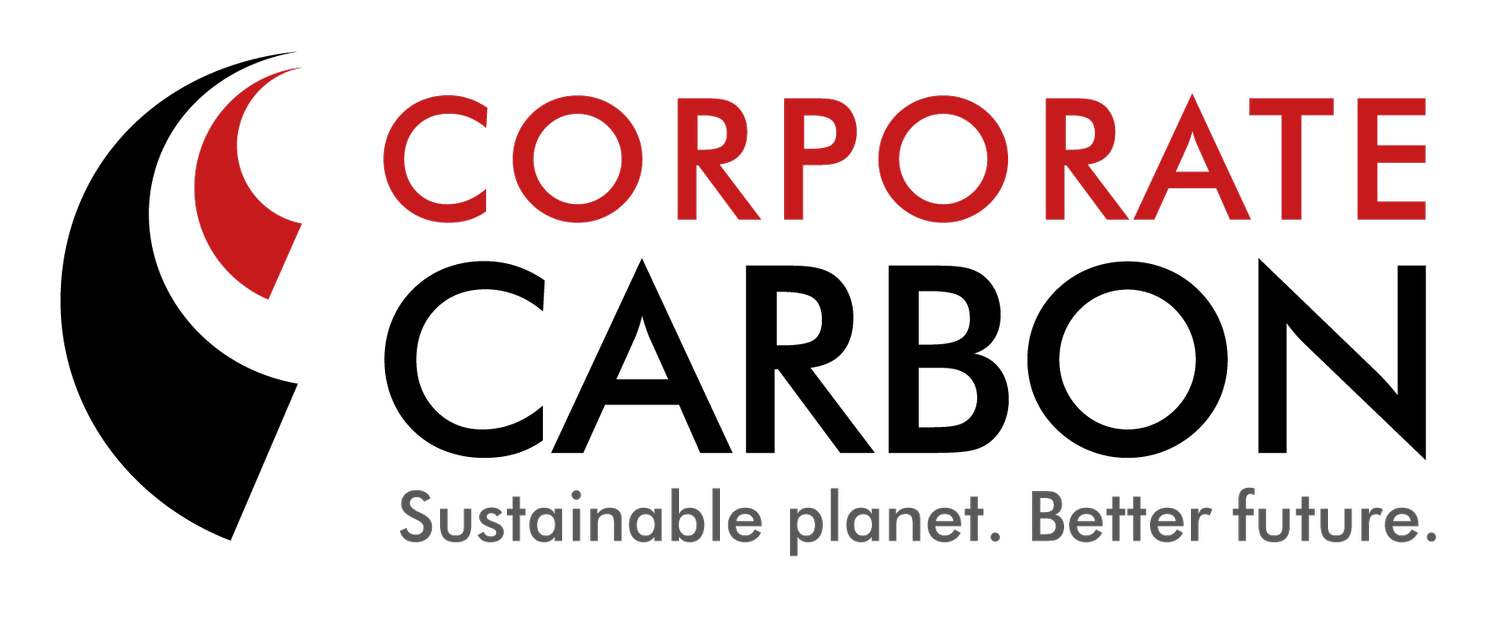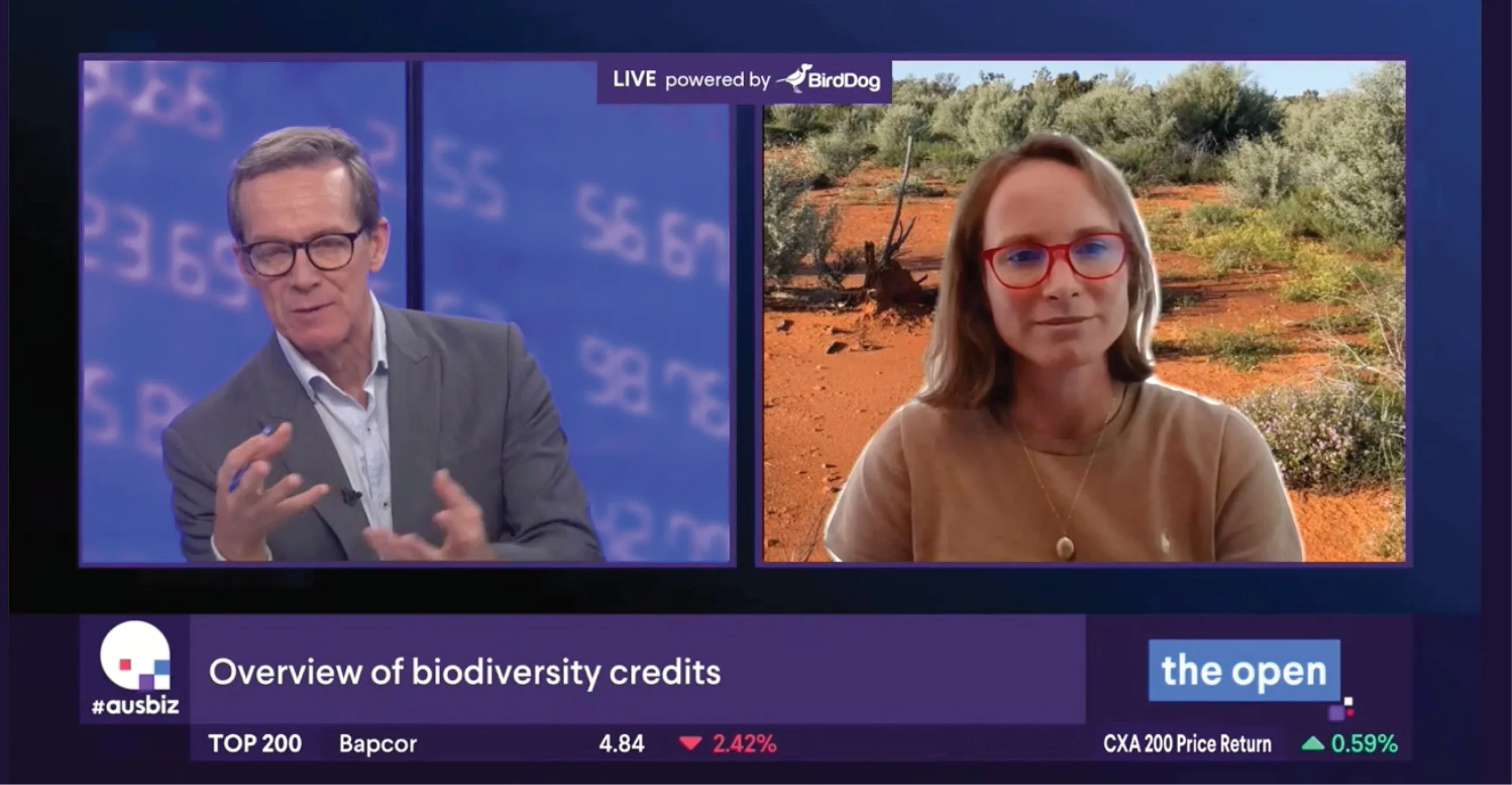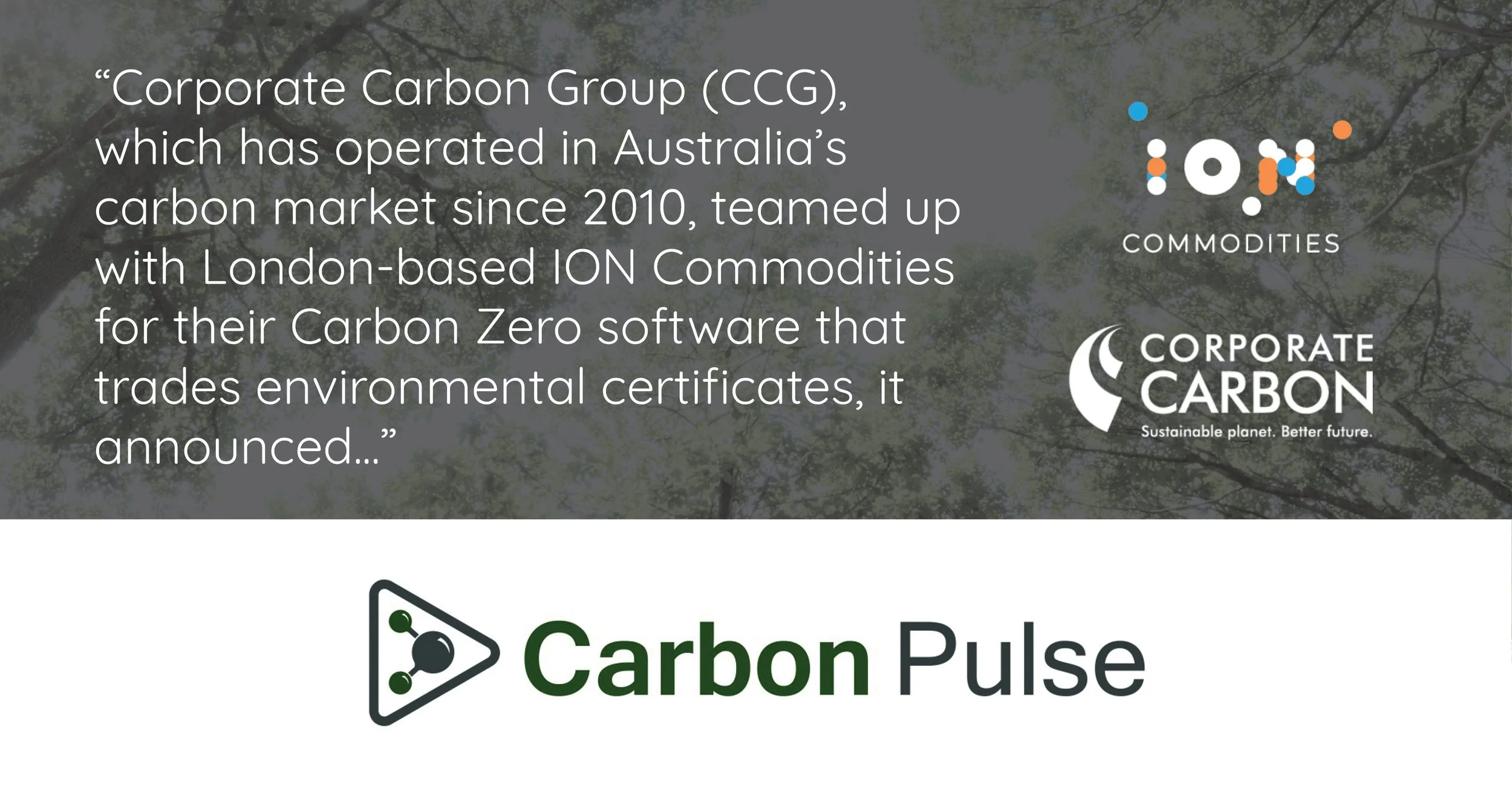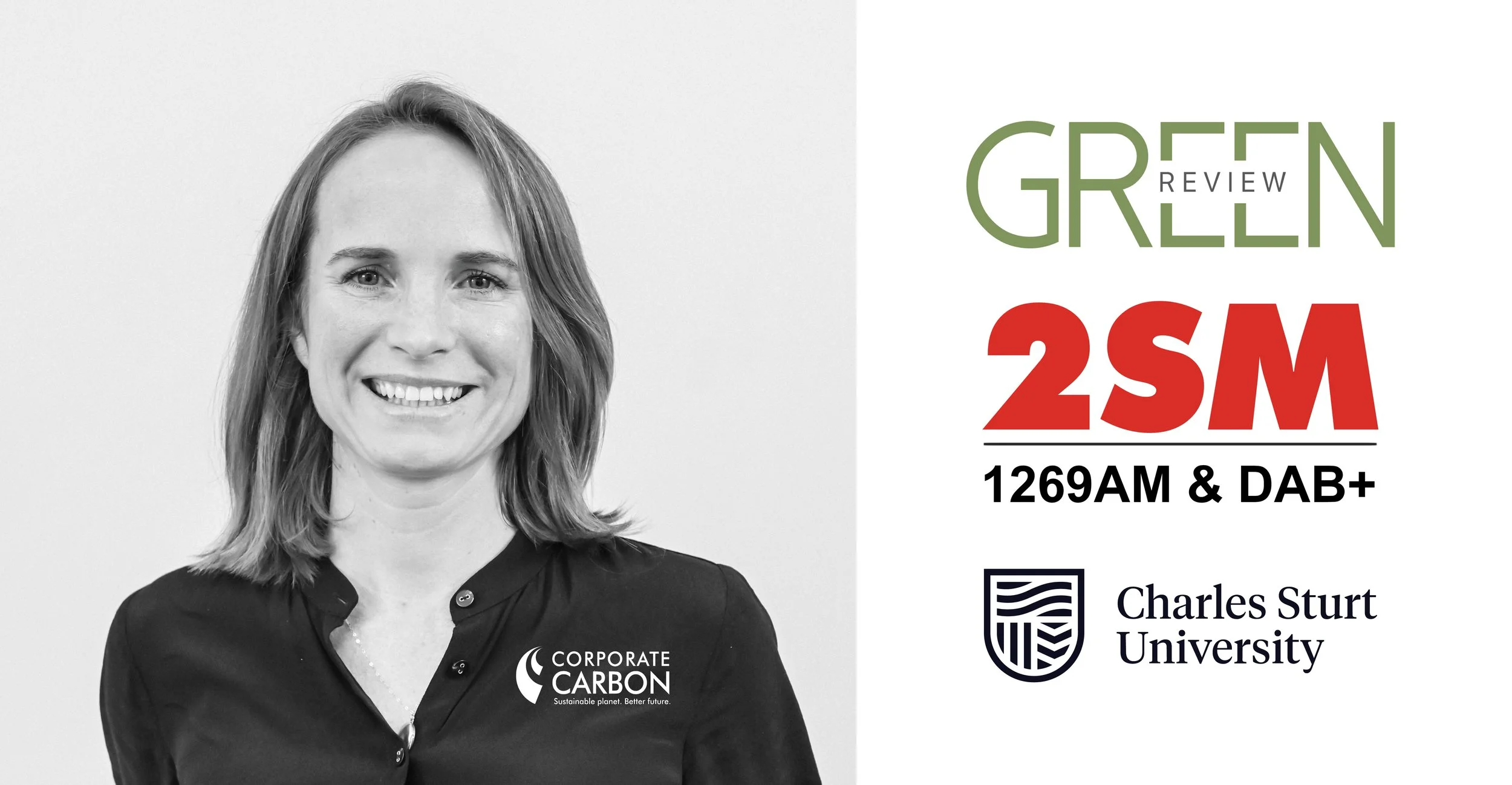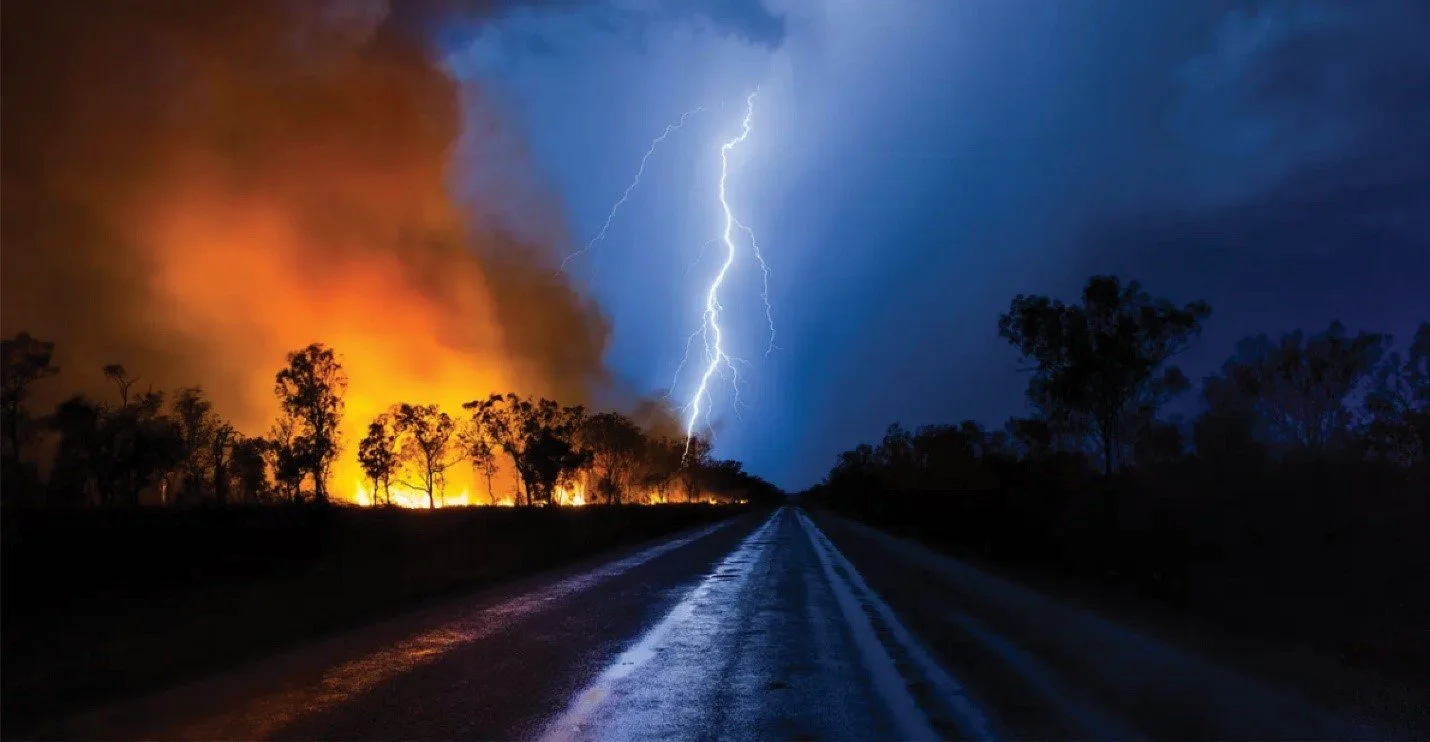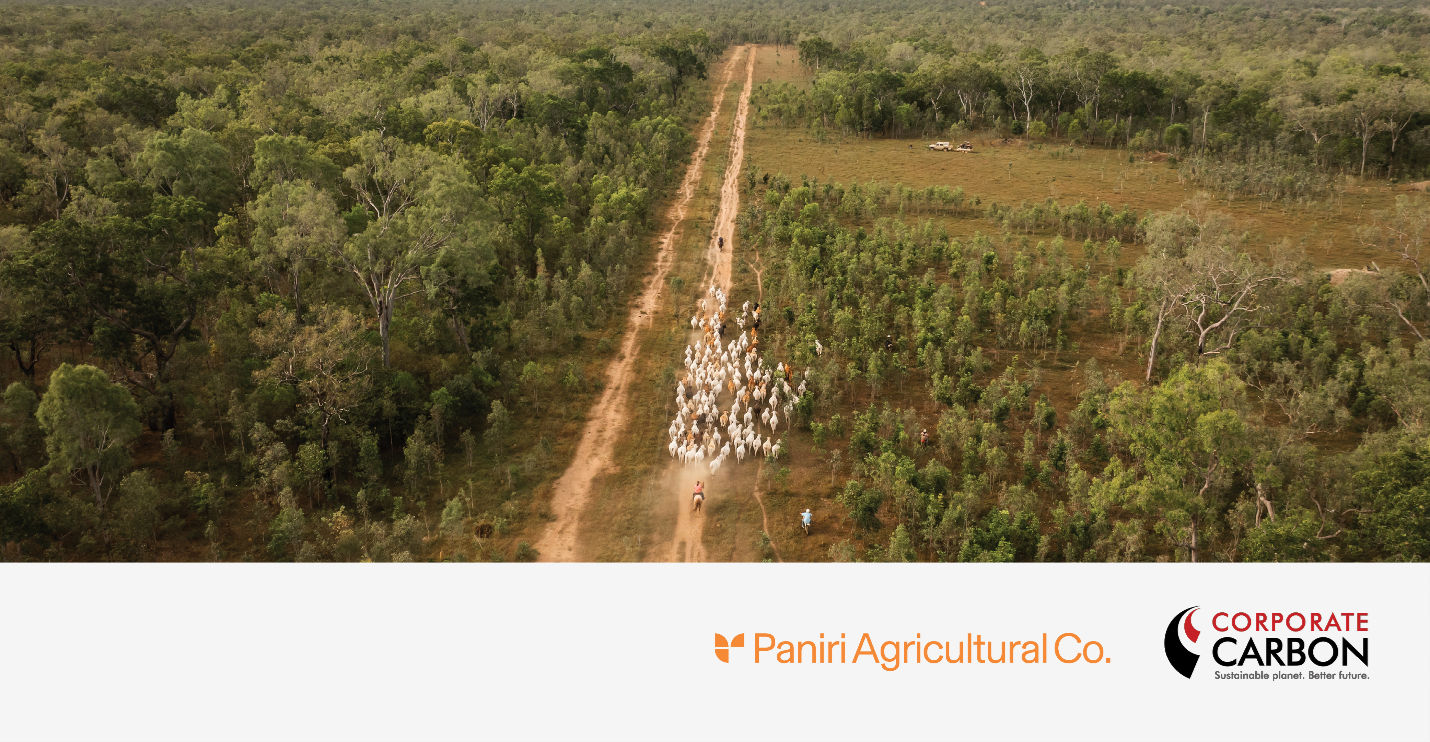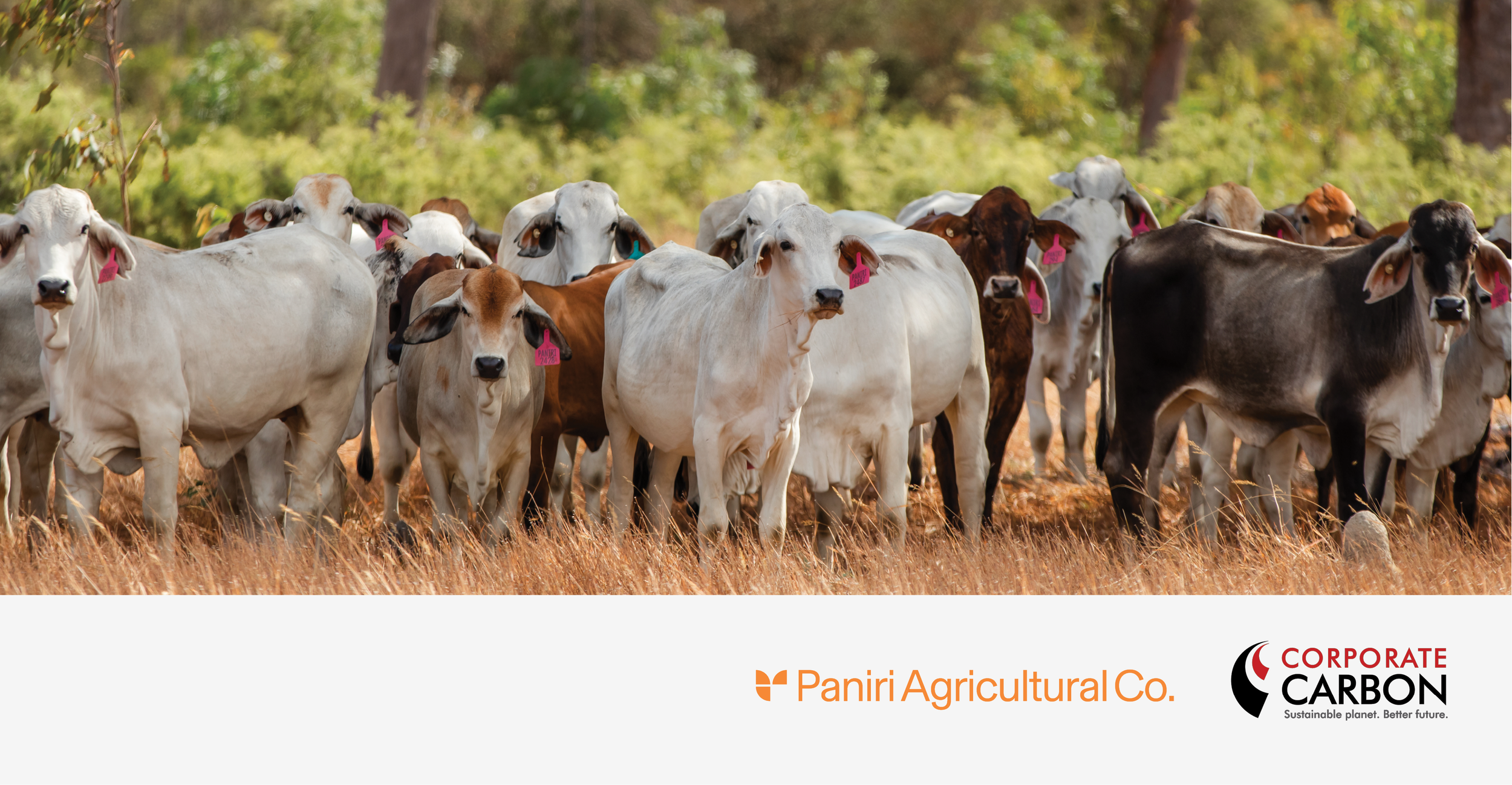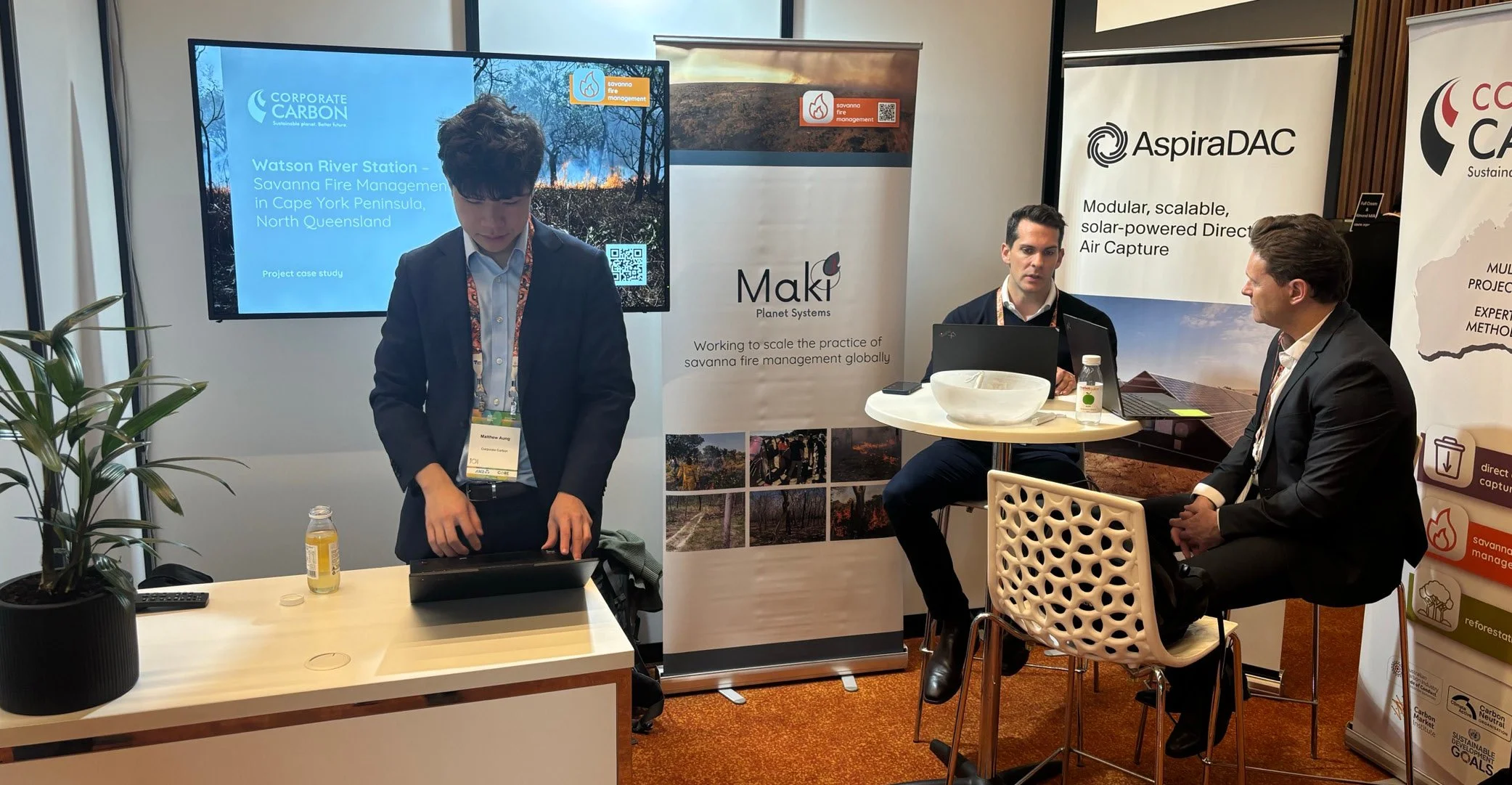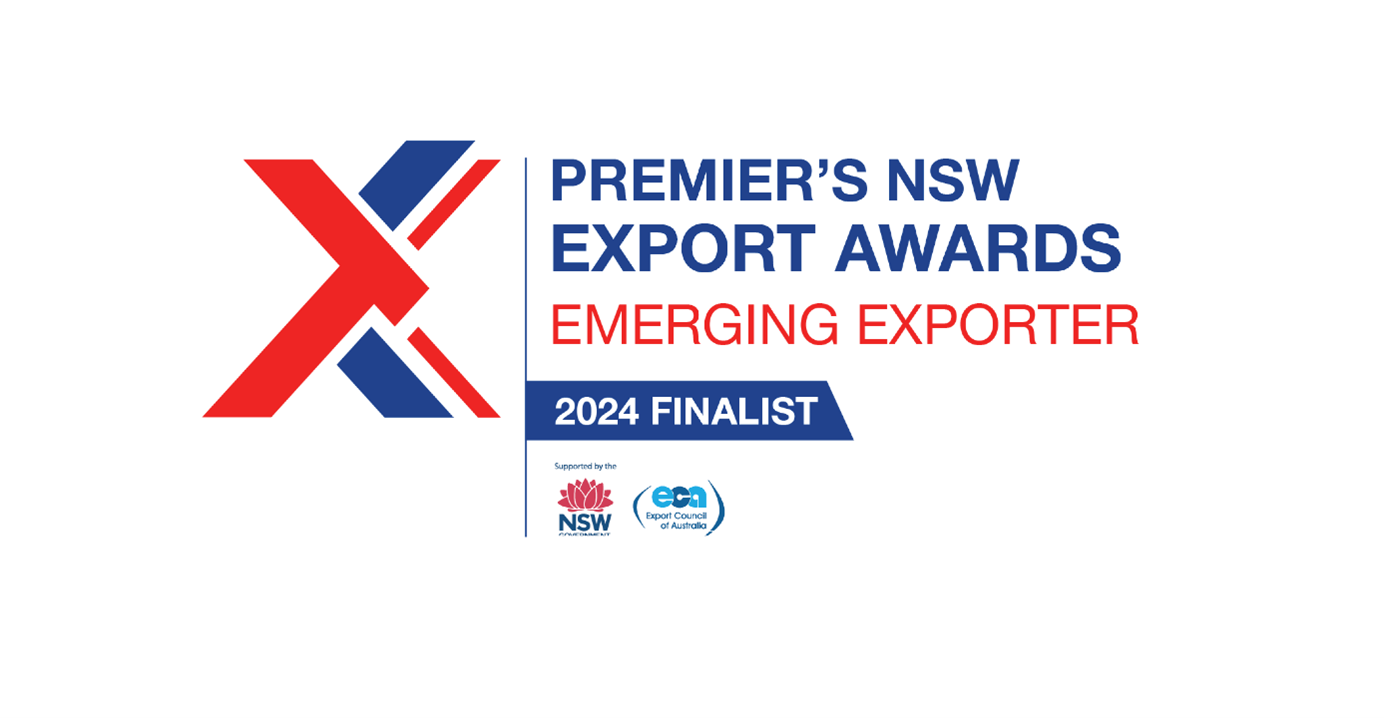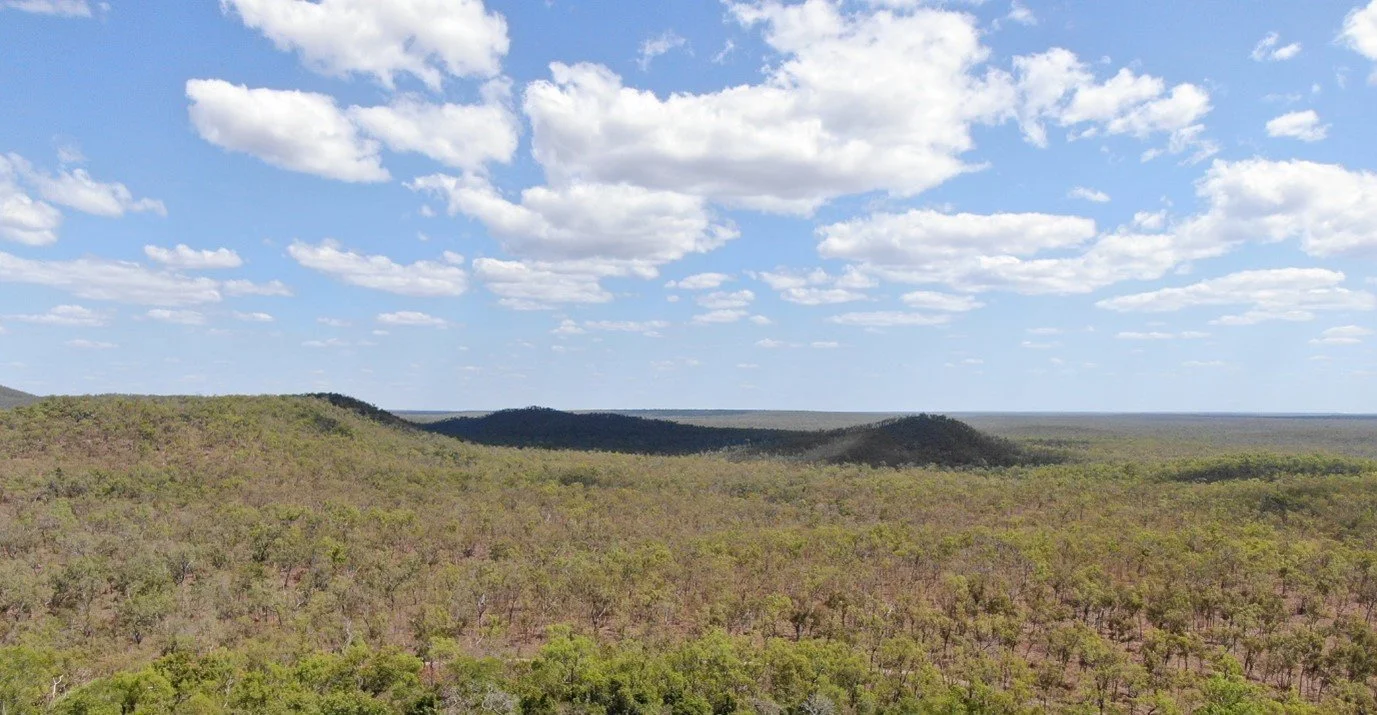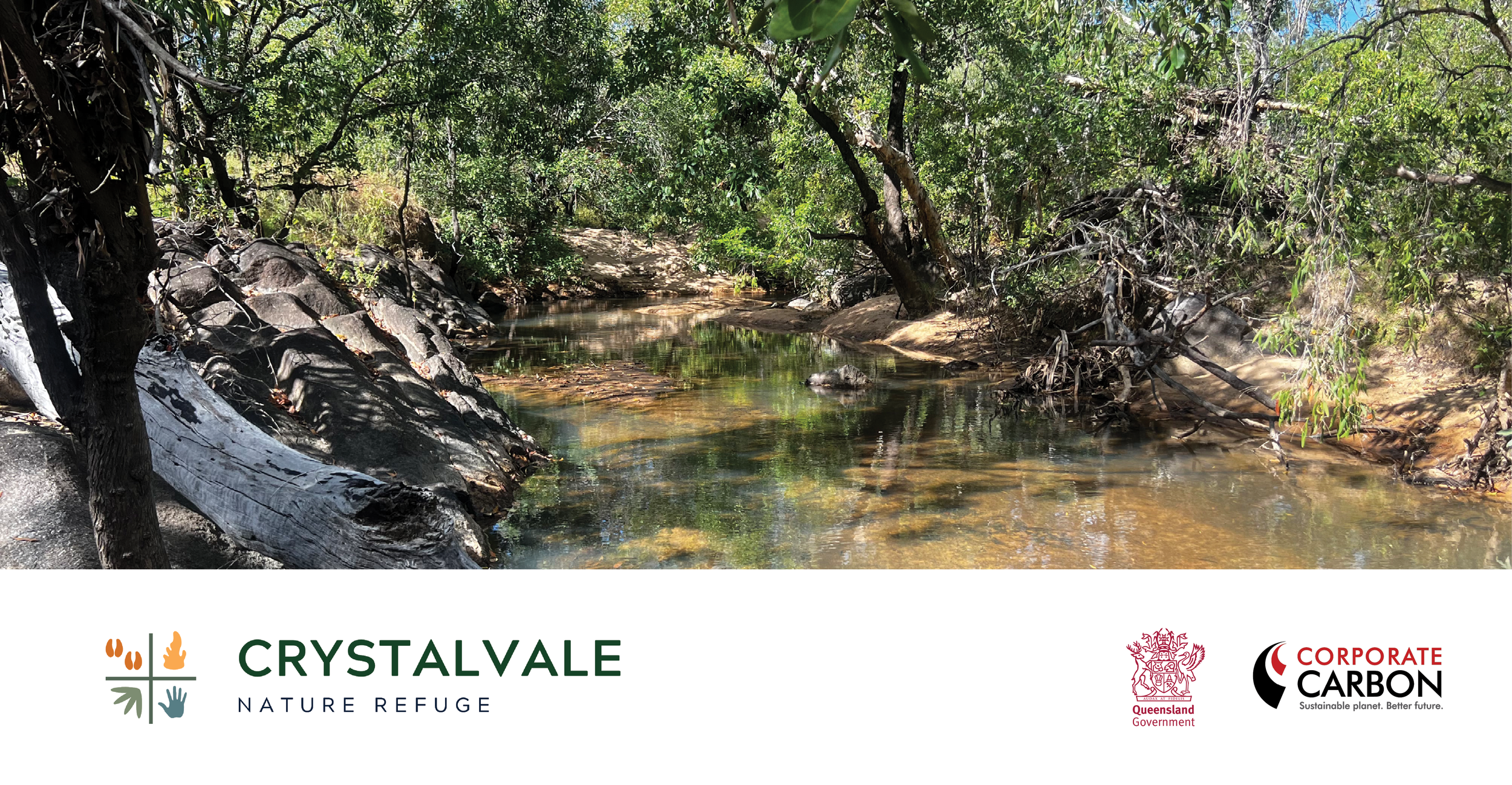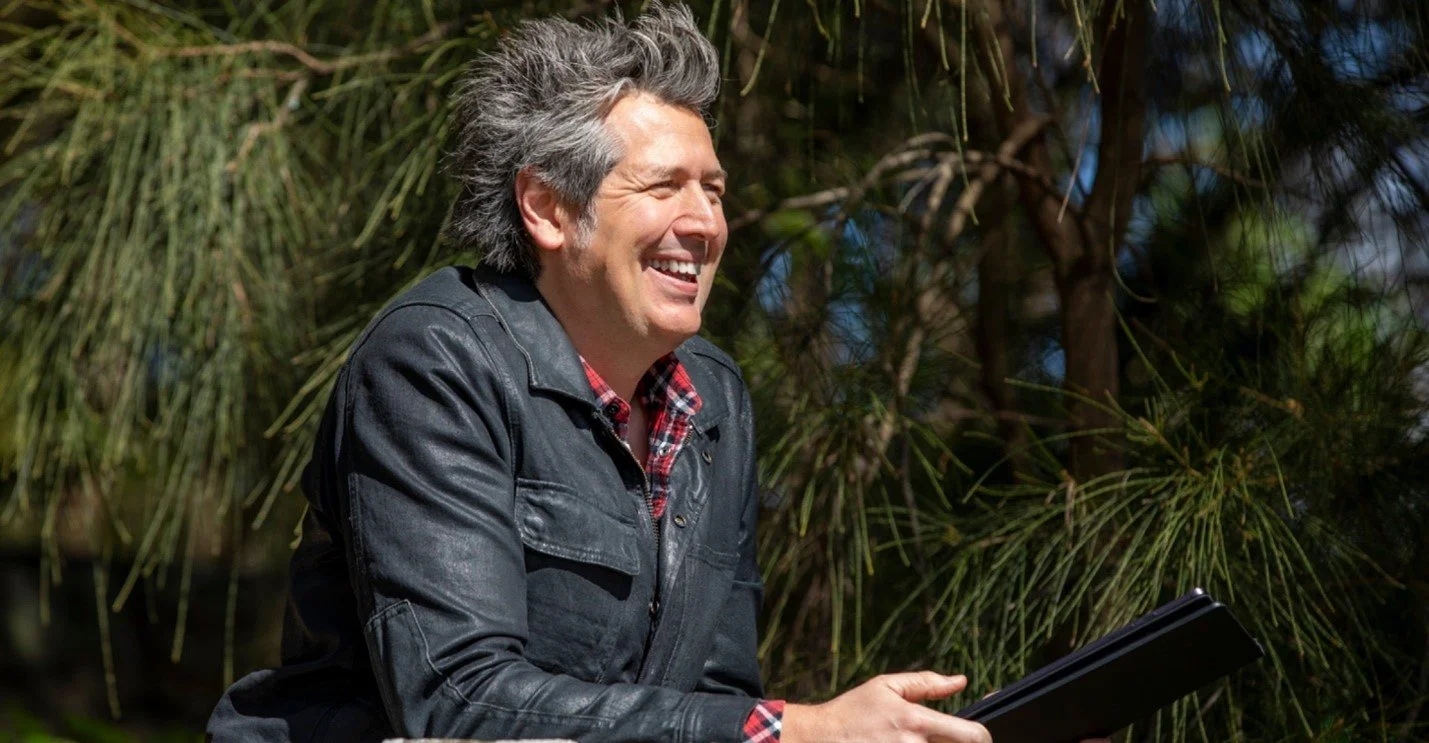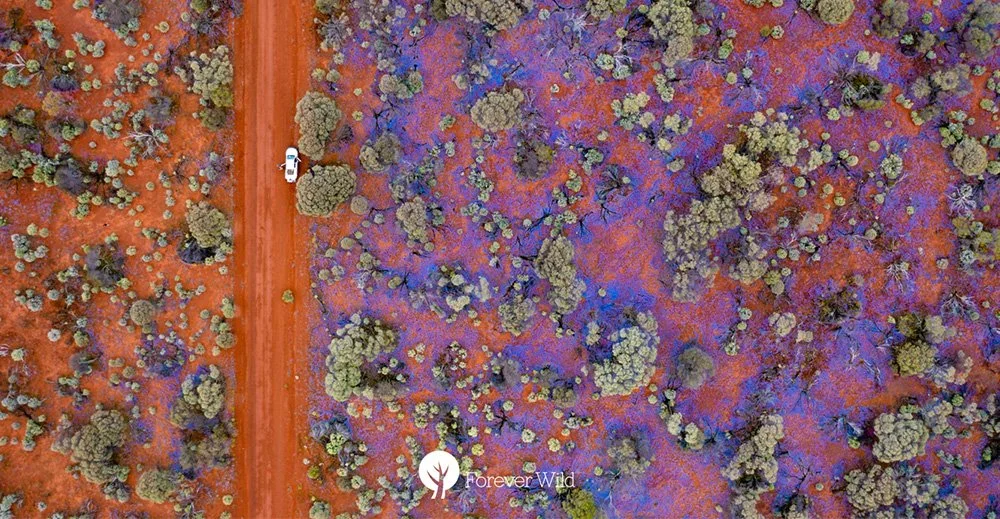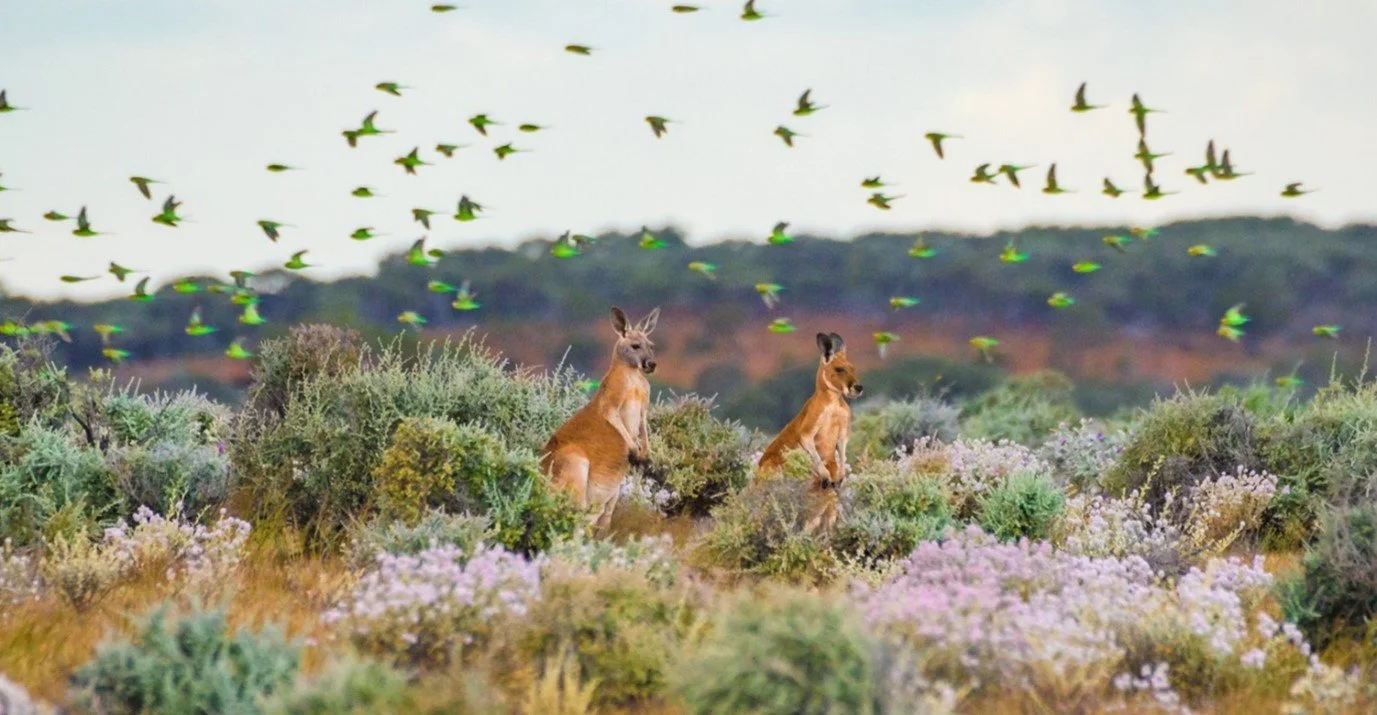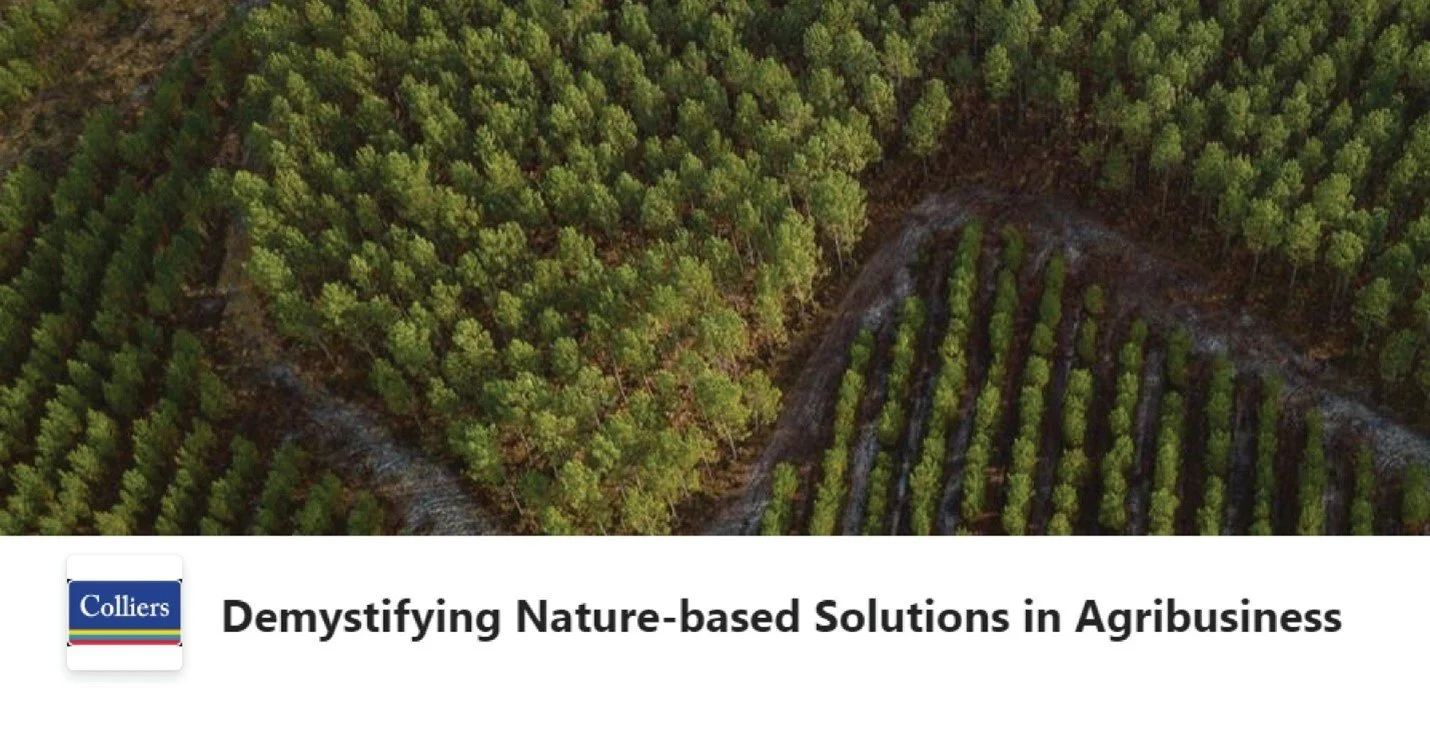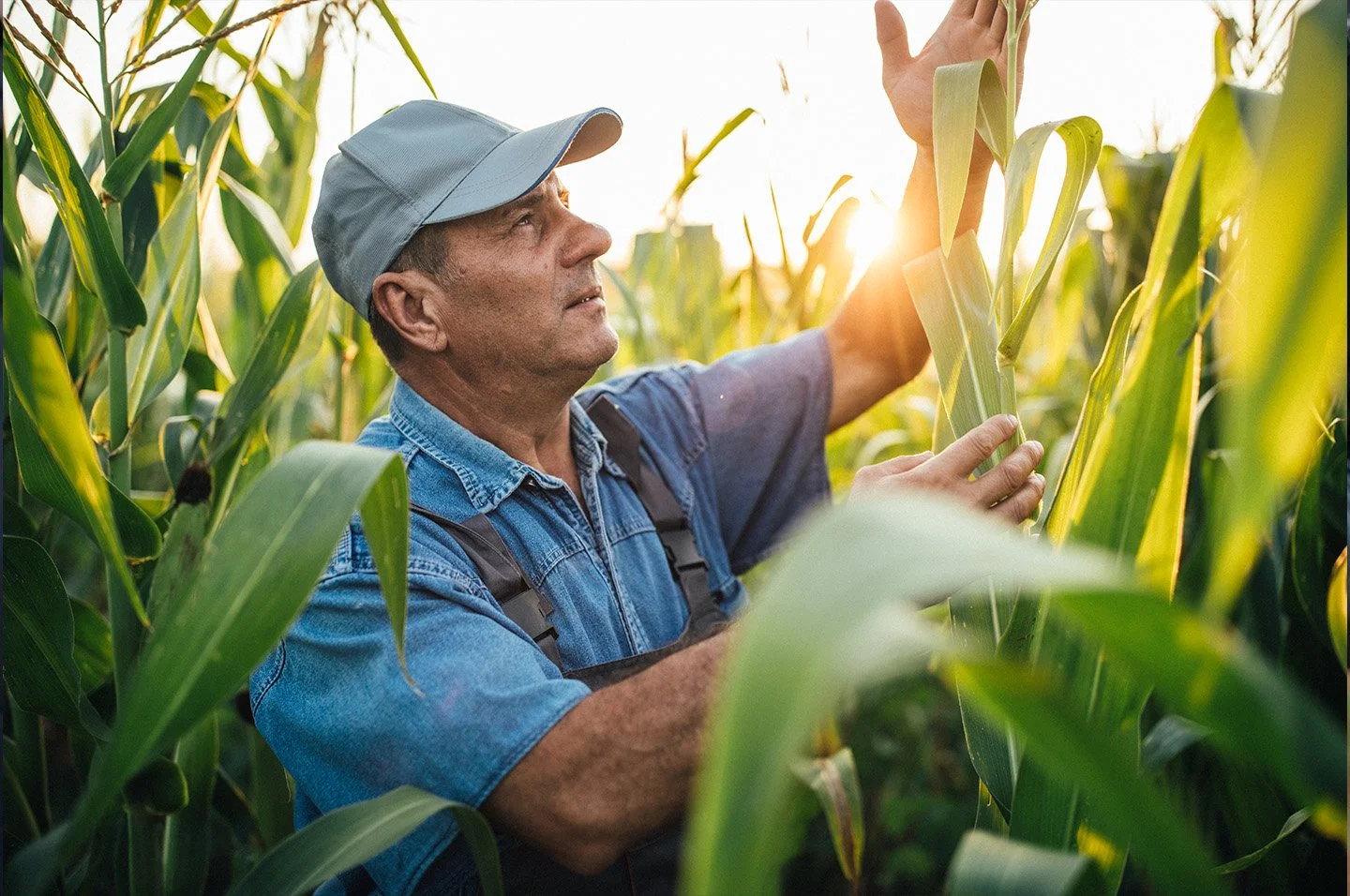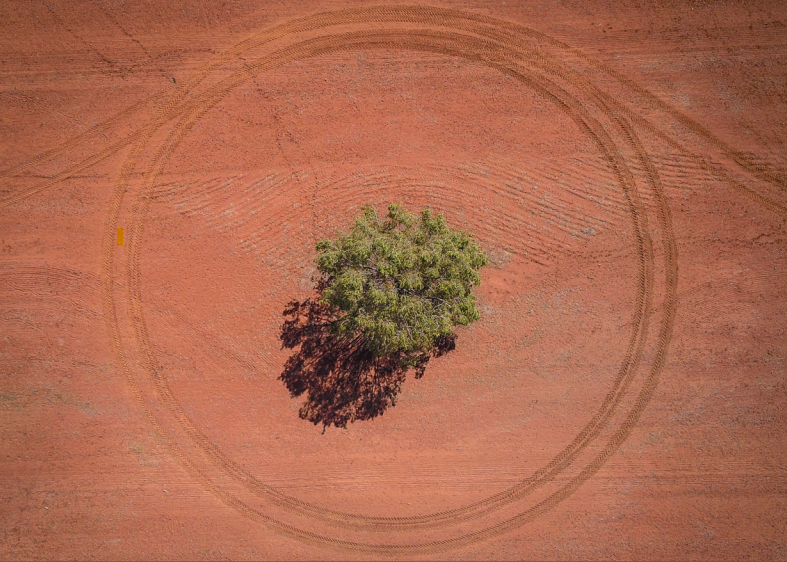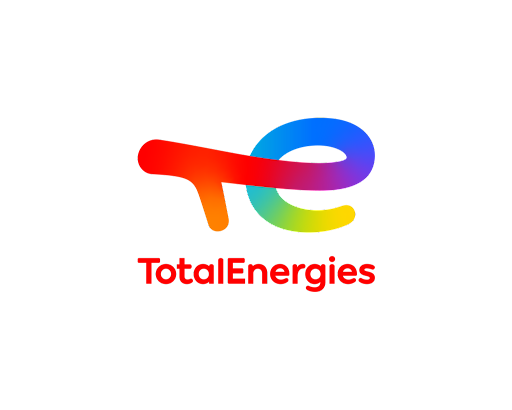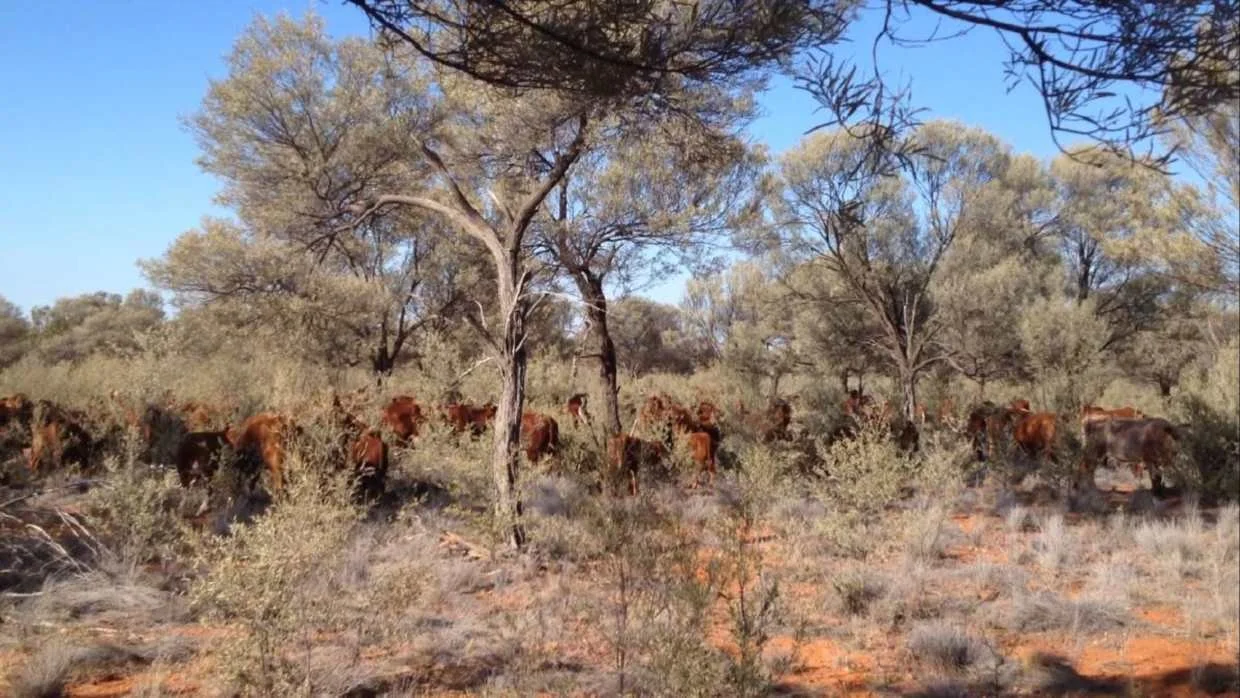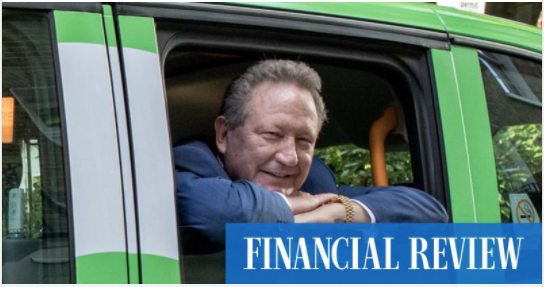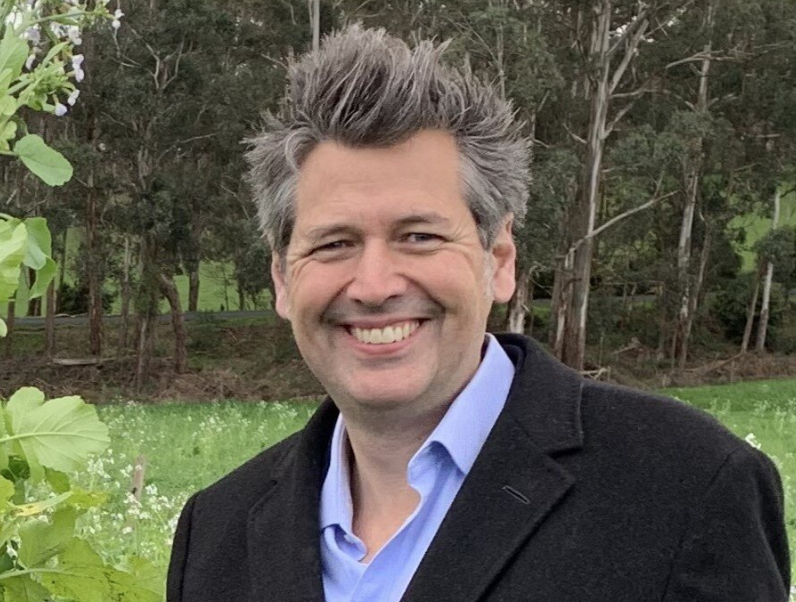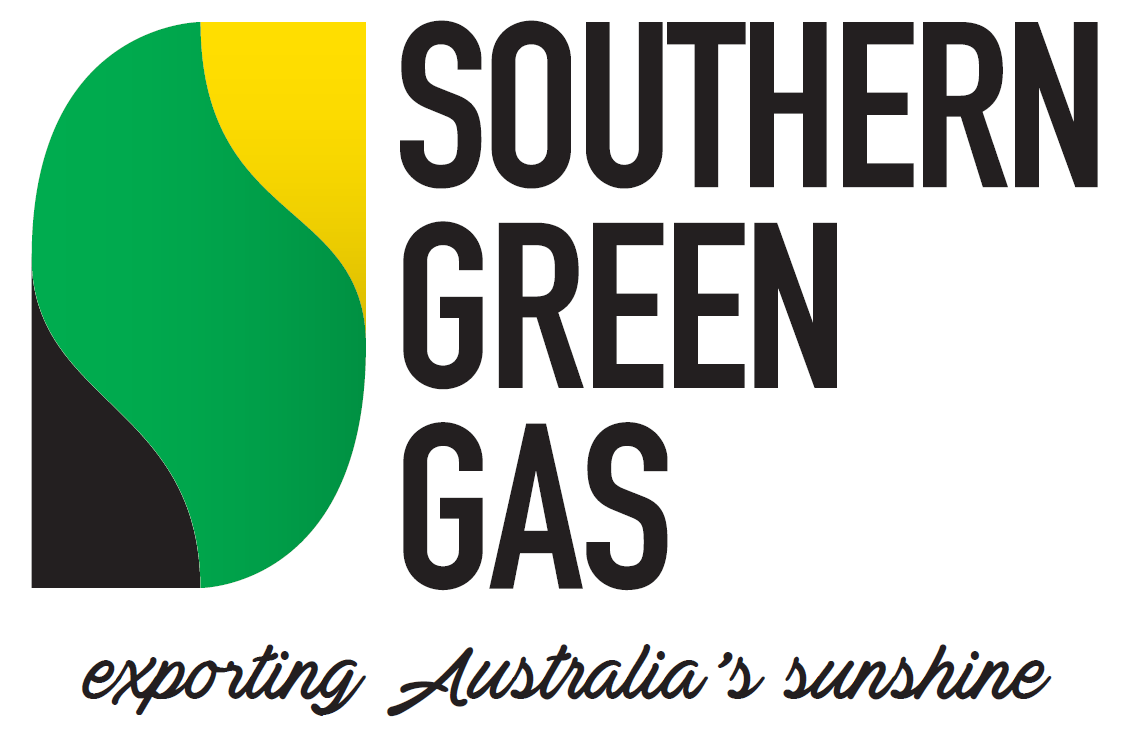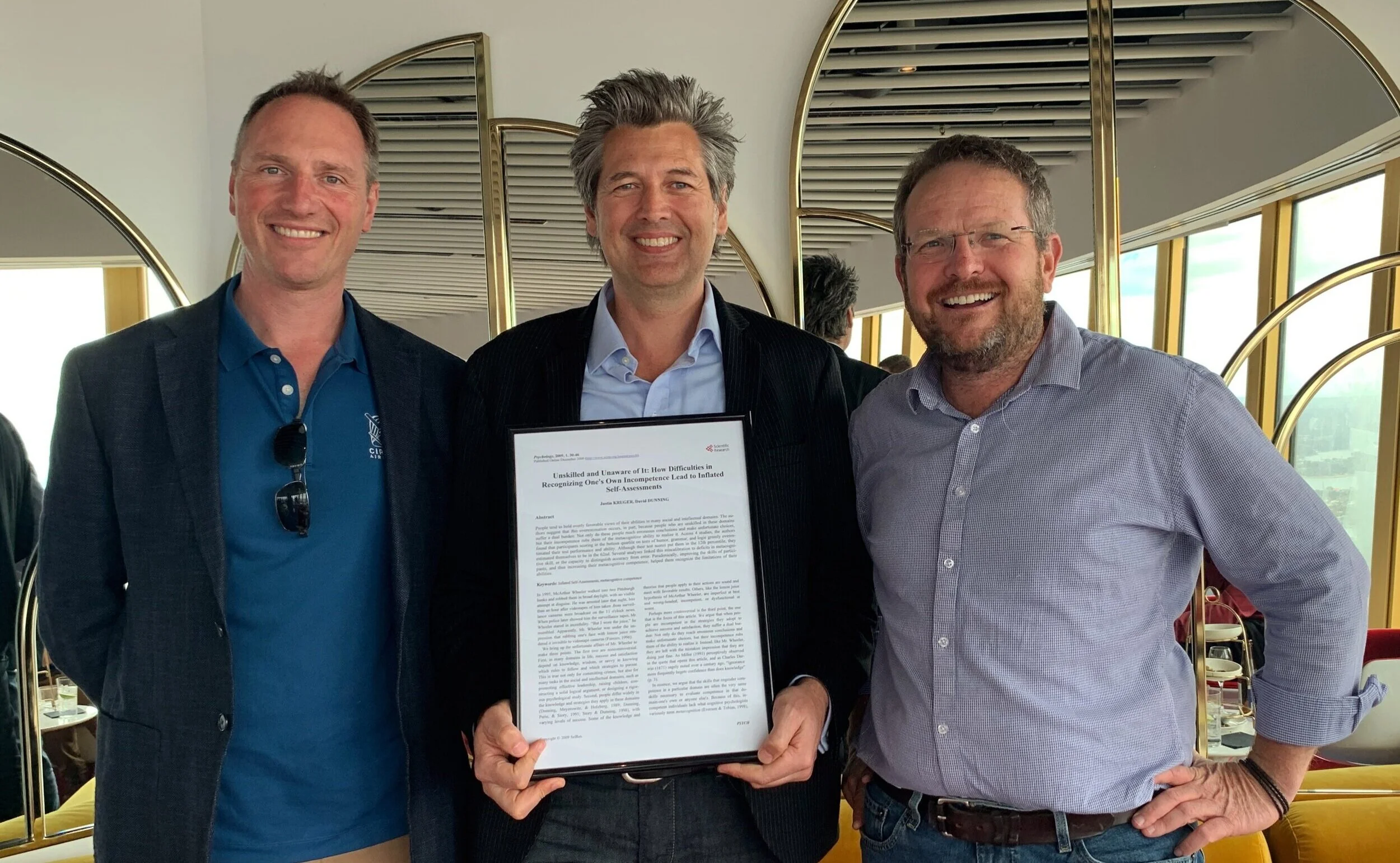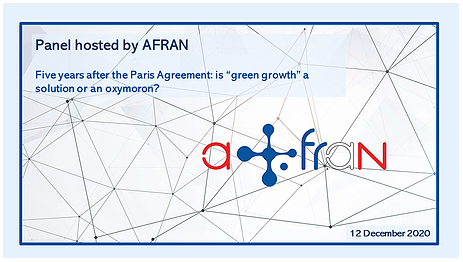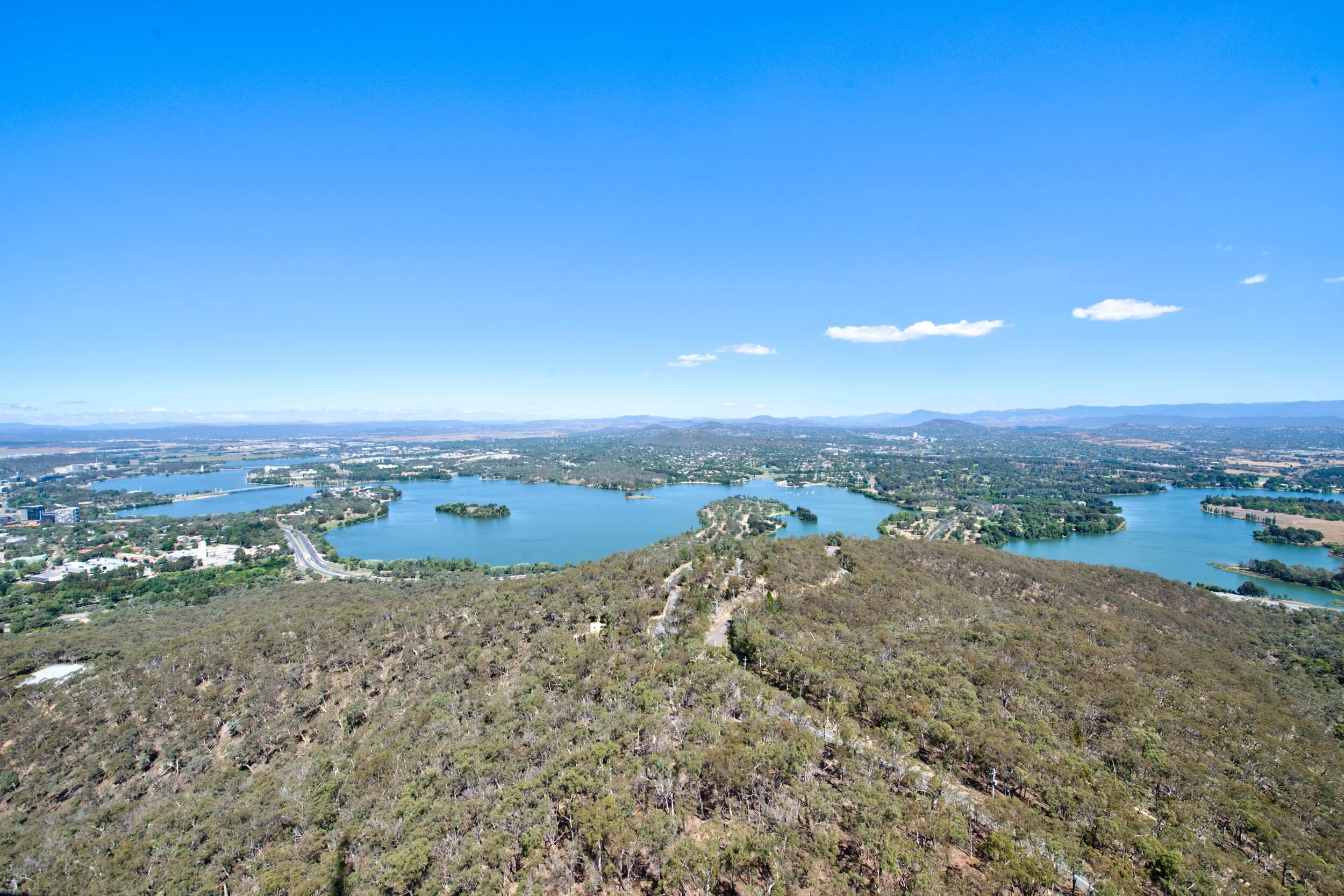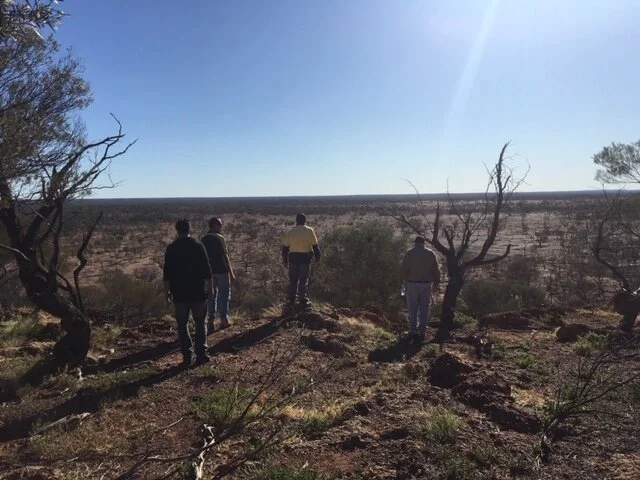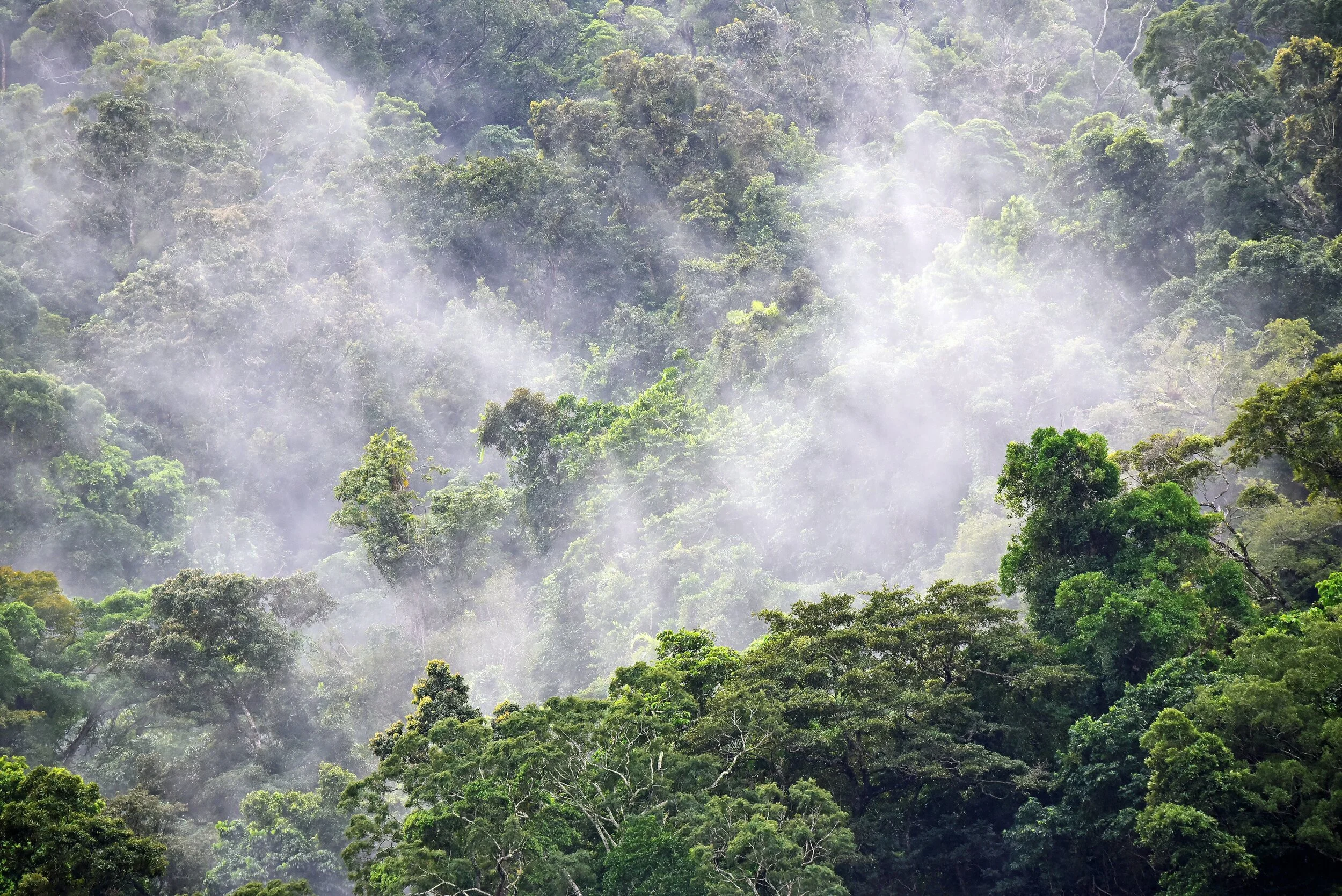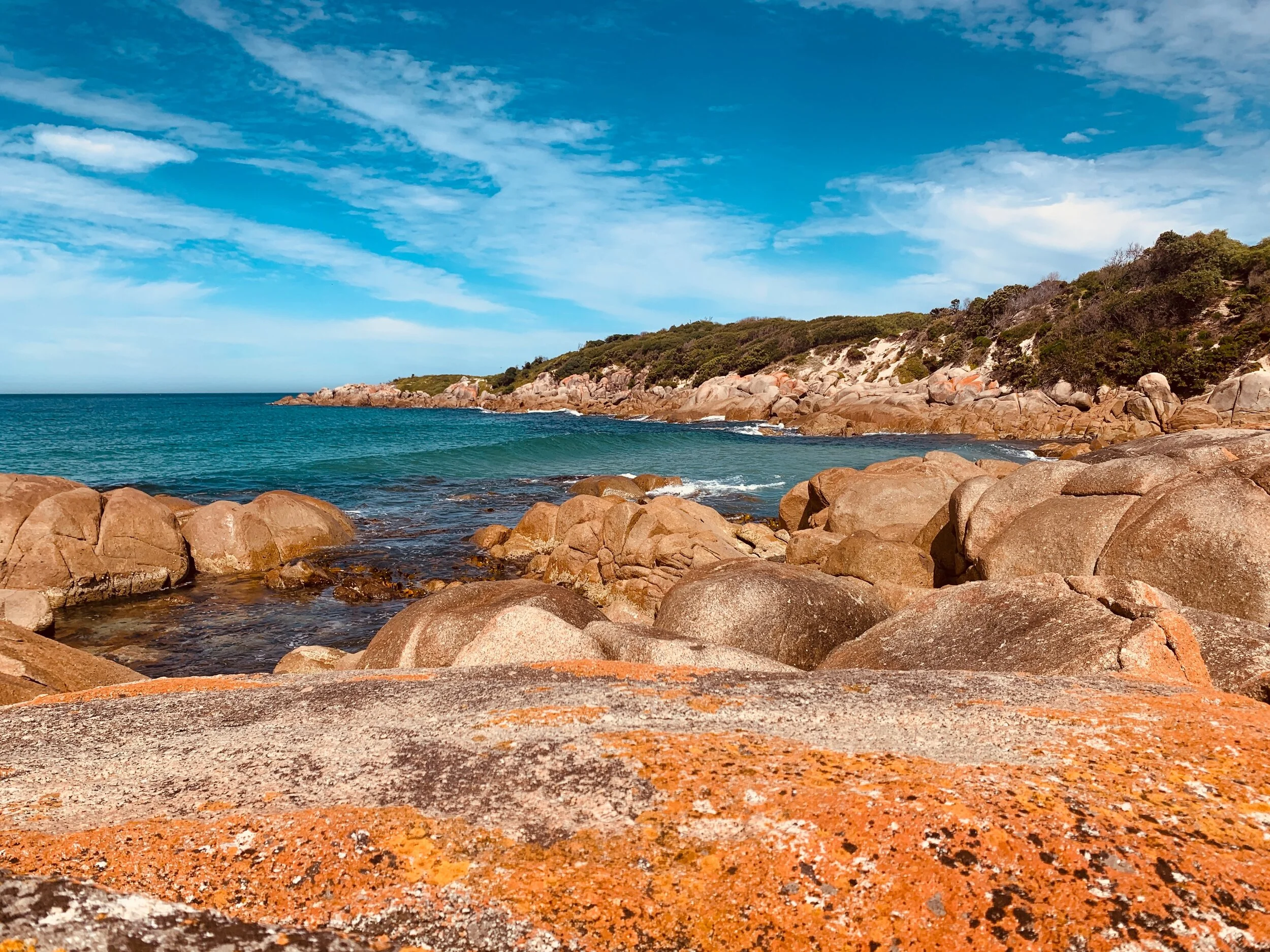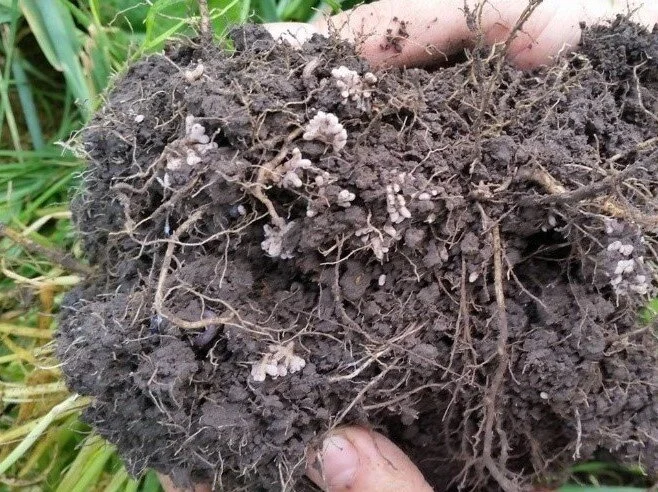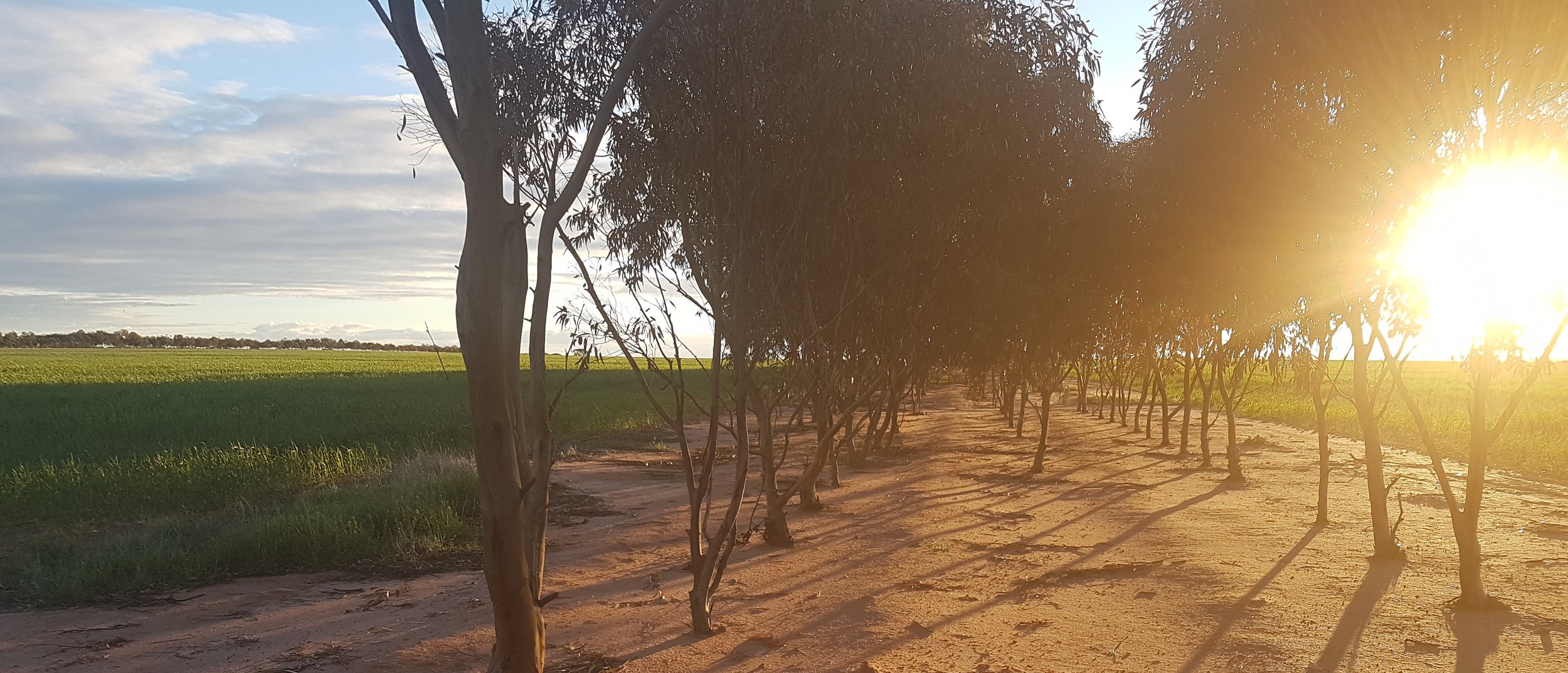
Sustainable planet. Better future.
News
28 March 2025 – Corporate Carbon partners with OREZ to unlock new value in organic waste processing
We’re thrilled to announce that Corporate Carbon has entered a Memorandum of Understanding with OREZ, a leading provider of end-to-end organic waste processing solutions.
This collaboration will allow OREZ to provide their clients with even greater support, helping them unlock new value from their organic waste processing projects. By working together, we will explore opportunities to register facilities for Australian Carbon Credit Units (ACCUs) and voluntary carbon credits, maximising both environmental and financial benefits for our partners.
We look forward to leveraging our combined expertise to drive innovation in waste management and carbon solutions.
13 March 2025 – In the news: Australia at the forefront of a biodiversity credit market
In a recent AusBiz interview with Andrew Geoghegan, Corporate Carbon’s Chief Technical Officer, Dr. Kate Dodds, spoke about Australia’s emerging biodiversity credit market and its potential to turn conservation efforts into investible assets.
Rewarding businesses for taking steps to reduce their environmental impact and for fostering practices that enhance biodiversity, Kate explained how our biodiversity market incentivises nature conservation. She went on to speak about key challenges to its success, including standardising measurements.
"You can’t value one species above another," said Kate, referring to the complexities of comparing different types of habitats. Despite this, Kate sees significant promise for the market in Australia with federal support and a standardised biodiversity unit.
“The voluntary biodiversity market is active overseas and in Australia we have a real opportunity to be a world leader in this type of environmental market,” said Kate. “There is a lot of potential for investment in the future.”
12 March 2025 – In the news: Corporate Carbon partners with SaaS firm to streamline operations
According to Carbon Pulse, the authoritative voice on environmental markets, project developers have lately been relying on software solutions to optimise their processes, and by partnering with London-based software-as-a-service (SaaS) firm ION Commodities, Corporate Carbon Group’s trading desk is no exception.
In 2024, we invested in ION’s Carbon Zero solution, to cater to growing demand for Australian Carbon Credit Units (ACCUs) and to streamline our operations for future expansion. Since going live with the software in October last year, we have witnessed transformative effects on our operations, decision making capabilities, and data reliability.
“The Carbon Zero software that trades environmental certificates has automated [for CCG] previously manual reporting tasks including value at risk, liquidity and inventory valuation reports, making them accessible through live data within the application,” wrote Arshreet Singh, Carbon Pulse’s Asia Pacific Correspondent. “CCG has completed over 100 verified carbon development projects that delivered more than 15 million ACCUs …”
12 March 2025 – In the news: CCG Chief Technical Officer Dr. Kate Dodds makes headlines with biodiversity market commentary
Corporate Carbon Group is at the forefront of Australia’s emerging biodiversity market with our Chief Technical Officer, Dr. Kate Dodds, hitting the airways and newsstands this week with her subject matter expertise.
Exploring how biodiversity credits, long considered the missing link between conservation and finance, are becoming tangible through enforceable certificates, an article by Green Review features Kate’s commentary: “Now Australia has the chance to make them real,” she said. “We must act quickly to set the standard and create methodologies before others do, leveraging our unique position as a country.”
Speaking on 2SM’s morning news bulletin, Kate noted the emerging biodiversity market could lead to more investment in green infrastructure, with natural capital becoming a powerful new driver in the sector. On Charles Sturt University’s National Radio News, she explained the aim of an offset or crediting system is to deliver net positive biodiversity gains, and the importance of a standardised system.
5 March 2025 – In the news: CCG Chief Technical Officer Dr. Kate Dodds calls for transparent and early planning to realise the benefits of carbon projects
Dr. Kate Dodds, Chief Technical Officer, Corporate Carbon Group, features in Beef Central, an Australian publication covering Australia’s agriculture industry.
In the article titled ‘Transparent and early planning needed to realise benefit of carbon projects’ Kate advocates for the ‘healthy country planning’ process developed with Indigenous people in Australia.
“There should be a formal process that is followed which is documented, transparent and shows how you are making sure everyone’s expectations are met,” notes Kate.
Video of the cultural heritage survey of Crystalvale Nature Refuge filmed by Grow Love Project
3 March 2025 – Savanna Fire Management goes global at the Indigenous Carbon Industry Network annual SFM forum
Australia’s Indigenous-led savanna fire management (SFM) success story is going global!
Corporate Carbon MD Gary Wyatt was honoured to attend the Indigenous Carbon Industry Network North Australia Savanna Fire Forum again – this year held 18-20 February.
With our subsidiary Maki Planet Systems bringing together its team from Botswana, Mozambique, South Africa and Brazil, the event delivered abundant highlights, from meeting The Hon Josh Wilson MP who’s leading the export of Australia’s successful savanna fire management practices overseas, to Maki's speaking engagement on the second day.
“It’s a pleasure to be able to bring the team together on Larrakia Country,” said Gary. “Well done to our awesome Maki Planet Systems global team for their great presentation and for the wonderful response it received!”
Video by The Indigenous Carbon Industry Network
12 February 2025 – Supporting integrity, transparency and carbon market evolution
Recent media articles from Nine Newspapers have raised important discussion on the integrity of Australia’s carbon market, in particular Human-Induced Regeneration (HIR) methods, and the Climate Active certification scheme. However, these reports present an incomplete picture of carbon removal projects.
As one of Australia’s leading carbon abatement developers, Corporate Carbon Group (CCG) welcomes public discussion on carbon markets. CCG is committed to delivering high-integrity carbon projects that support landholders, investors, and Australia’s climate goals through robust, science-backed outcomes.
Ensuring integrity and transparency in carbon projects
At CCG integrity is at the core of our approach. Our projects comply with the highest regulatory standards, undergo rigorous independent verification, and deliver measurable environmental and economic benefits. We work closely with landholders, Traditional Owners, and scientific experts to ensure our projects contribute to genuine carbon sequestration, biodiversity enhancement, and regional prosperity.
Addressing concerns around HIR projects
CCG recognises the importance of continuous improvement in carbon sequestration methodologies to maintain market integrity and ensure that carbon credits represent genuine emissions reductions.
We welcome the fact the Clean Energy Regulator actively encourages and has already implemented greater transparency and stronger performance requirements for these projects.
A process of robust performance assurance through gateway checks introduced in recent years has strengthened the HIR methodology overall. This is a positive step toward strengthening the credibility of carbon credits, but we acknowledge the frustration some landholders are experiencing as their expected returns have changed due to updated methodology requirements. It’s worth noting the shortfall has been partly counteracted by higher ACCU prices.
The management of grazing is an effective tool in restoring environmental condition. We work closely with several cattle stations, which run its own beef herd, to ensure these projects are completed with high integrity and environmental benefit.
As necessary reforms move through the sector, it is crucial that:
● Service providers forecast as accurately as possible and work closely with landholders to ensure realistic expectations around ACCU issuance
● Contracts align with the Carbon Market Institute (CMI)’s Code of Conduct, ensuring they are fair, transparent, and not overly burdensome for landholders.
CCG remains committed to navigate ongoing improvements in methodology changes and ensuring carbon projects deliver measurable, long-term environmental and economic benefits.
Supporting a strong and evolving carbon market
CCG supports reforms that enhance transparency, improve market certainty, and ensure businesses can continue to engage in carbon markets in a meaningful way. By refining how businesses measure and reduce emissions, the sector can strengthen confidence in carbon markets while driving real climate action.
The decision by some companies to step away from re-registering for Climate Active carbon certification highlights broader challenges in carbon market policy and certification, not a fundamental failure of the ACCU Scheme. While businesses should absolutely seek out and demand high-quality, high-integrity carbon projects, our experience in the sector suggests that this is not the primary reason why companies are exiting Climate Active certification.
A national registry and carbon neutrality certification system must evolve to better accommodate businesses’ own mitigation efforts, rather than functioning solely as a reporting tool for emissions and offsets. As the market shifts - particularly with mandatory climate reporting coming into effect this year - it is critical that certification schemes keep pace with corporate needs, ensuring they remain relevant, adaptive, and effective.
10 February 2025 – Corporate Carbon MD Gary Wyatt explores fire management and carbon removals in RM Williams Outback Magazine
The February - March 2025 issue of RM Williams Outback Magazine has hit the stands leading with an extensive article titled Under fire: Our best friend and biggest foe by Ken Eastwood.
From First Nations fire rangers to local landowners and specialist academics, the story captures a broad scope of perspectives on fire. Discussing voluntary and compliance markets in Australia, Gary’s contribution focused on carbon abatement programs.
"There is a surplus of (SFM) ACCUs in the market, but this is likely to change because offset targets are increasing, so demand will increase," said Gary.
Image credit: RM Williams Outback Magazine
10 January 2025 – In the news: Owning and operating two of Australia’s largest farms
Australia is filled with huge farming properties, some the size of a small country.
Two properties owned and operated by Corporate Carbon's natural asset management subsidiary, Paniri Agricultural Co. feature in The Weekly Times’ list revealing who owns the 200 largest farms across the nation.
Making the list at #76, the Holroyd, Yarraden and Crystalvale aggregation sprawls across 433,594 hectares in Far North Queensland while Ban Ban Springs Station in the Northern Territory at 187,300 hectares, capped the list at #192. Both properties are home to Savanna Fire Management (SFM) carbon projects. Another Paniri property, the Quilpie Aggregation in Charleville Queensland fell just short of the top 200 at 166,000 hectares.
Subscribe to read the full article.
16 December 2024 – Corporate Carbon Group donates to Pormpuraaw Community Christmas Ball
Corporate Carbon Group (CCG) was pleased to donate $1000 towards the 2024 Pormpuraaw Community Christmas Ball.
Pormpuraaw is a town of around 600 people situated on Queensland’s Cape York Peninsula near several of CCG’s agricultural stations including Holroyd, Yarraden and Crystalvale. Since 2022, we have operated savanna fire management (SFM) carbon projects near Pormpuraaw and have visited the community multiple times to engage with native title holders.
This December, local organisations including Prompuraaw’s Aboriginal Shire Council, Art & Culture Centre, United Brothers Sports Club and the Pormpur Paanthu Aboriginal Corporation joined forces to arrange a wonderful end-of-year party with activities and entertainment for everyone, from the youngest children to community Elders.
With fireworks, live music, stilt walkers and fabulous refreshments, CCG was thrilled to be involved in making the evening an extra special one!
Fireworks in Pormpuraaw: Picture by Deleece Bowen, Indigenous Engagement Officer, Corporate Carbon Group who attended.
3 December 2024 – In the news: Meet the people and companies behind Queensland’s biggest farms in 2024
Corporate Carbon’s subsidiary, Paniri Agricultural Co., has made it onto The Courier Mail’s 2024 list of people and companies behind Queensland’s biggest farms.
Revealing the farmers, families and companies that own and work Queensland’s largest agricultural holdings, the extensive list mentions several Paniri pastoral stations covering nearly half a million hectares of land between them.
“Paniri Agricultural Co. is a natural asset manager dedicated to delivering 100 per cent sustainable agriculture production,” notes the writer, Iwan Jones. “It has an environmentally-driven approach to agricultural production with three properties in Queensland: Holroyd Aggregation at Coen, Quilpie Aggregation at Charleville and Watson River Station at Weipa.”
As part of Corporate Carbon Group, Paniri Agricultural Co. takes the experience of a company that’s been engaged in the carbon farming industry from the very beginning and combines it with leading agribusiness expertise to help reduce emissions at scale while improving agricultural production.
A Paniri Agricultural Co. herd at Holroyd Station.
29 October 2024 – Corporate Carbon set and ready for the Carbon Market Institute’s 11th Australasian Emissions Reduction (AER) Summit
Corporate Carbon has been involved in the Carbon Market Institute’s annual AER summit since its inception in 2013—and this year is no exception. Held across 29-30 October 2024, the summit brings together global and regional leaders to accelerate policy and investment towards a net zero future.
As gold sponsors, our team comprising Gary Wyatt, Managing Director; Julian Turecek, Executive Director and Co-Founder and CEO, AspiraDAC; Marc Train, Group Commercial Officer; Dr. Kate Dodds, Group Technical Officer; Angus Roberston, Head of Carbon Trading; Jean-Paul (JP) da Costa, Head of BD & Stakeholder Relations; and Matthew Aung, Commercial & Carbon Trading Analyst, have set up shop at booth 12. They are excited for the action-packed two-days ahead!
If you’re attending, be sure to check out Julian Turecek’s panel engagement at 11:50AM (UTC+11) today (Tuesday 29 October) discussing “Carbon Markets 2.0 – from offsetting and carbon neutrality to removals”, and on Wednesday 30 October, take in the “Data to Drive Decarbonisation and Integrity” workshop at 12PM (UTC+11) where Kate Dodds will present among a panel.
Stop by Booth 12 at the 11th AER Summit to be welcomed by the Corporate Carbon Team
16 October 2024 – Supporting Cape York Peninsula’s land managers dealing with woody thickening
Published by Cape York NRM, Corporate Carbon was pleased to contribute to a new local landowner guide to understanding and managing woody thickening.
Woody thickening refers to the excessive growth of certain plant species which can hinder natural ecosystems, impact land productivity, and affect biodiversity. It has affected the peninsula since the introduction of cattle, and has intensified in recent decades, creating problems for land managers.
Aiming to clarify its causes, and how it can be managed using fire, the guide hears from a variety of perspectives including individual landowners, and fire practitioners. Our input was framed around carbon projects, which reward proper land management, including preventing woody thickening on grasslands.
“The fire regime is the main determinant as to whether you have a healthy open grassland or woody thickening,” explained Corporate Carbon’s spokesperson. “Land managers should use the fire regime that’s appropriate for the place … while savanna fire management carbon projects tend to facilitate the growth of biomass, many ecosystems are ineligible for carbon farming because early dry season burns have no place.”
18 September 2024 – Statement on The Age article
Commentary from Corporate Carbon Managing Director, Gary Wyatt is below:
Definitive climate action is needed now more than ever and carbon credits play a small but important bridging role in climate policy. However, for large-scale impact, Australia needs greater government regulation, policy and investment to drive the avoidance and reduction of emissions across the broader economy to meet our international climate commitments.
The enormous task of decarbonisation and reducing our collective carbon footprint falls not just on large energy companies, but on all of us.
This will not be achieved if all businesses, including energy companies, do not participate in the transition. Everything we know about human behaviour tells us that the required transformation of the economy will require either strong incentives, strong regulation, or a mix of both. Australia’s climate policies, including the Safeguard Mechanism, ensure that these incentives are only truly realised if a business is actively decreasing their carbon footprint.
While avoiding and reducing emissions as much as possible is key to achieving the goal of net zero by 2050, high-quality carbon credits - delivered with integrity - are a crucial, cost-effective mechanism for hard-to-abate emissions, creating momentum on climate action while new technologies are being developed and scaled.
Reaching this target requires large-scale collaboration and investment. Corporate Carbon will work with partners that help us achieve our goal of delivering carbon dioxide removals at the gigatonne scale. As a minority shareholder, Shell has been a valuable investor in our carbon projects and company. But as a leading carbon developer in the Australian carbon market, we work with an extensive range of stakeholders, including corporates both large and small, Traditional Owners and First Nations communities, farmers, State and Federal governments, industry associations and academics - all with the goal of driving climate action.
16 September 2024 – Maki Planet Systems is a finalist in the Premier’s NSW Export Awards
Congratulations to Maki Planet Systems, a subsidiary of Corporate Carbon Group, on being named a finalist in the Emerging Exporter category of the 2024 Premier’s NSW Export Awards.
Running for its 62nd year, the Premier’s NSW Export Awards recognises companies of all sizes and industries making their mark on the global stage and significantly contributing to the state’s economy and business community.
Established in 2021, Maki combines Australian wildfire knowledge with satellite technologies and exports the nation’s successful savanna fire management strategies worldwide to reduce carbon emissions and protect ecosystems.
Culminating with an exuberant gala ceremony at Sydney Town Hall on 11 October, the category finalist accolade saw Maki Planet Systems compete for the Emerging Exporter title alongside 5 fellow achievers—Koko & Karma, Data Jukebox, G&M Orient, The Whiskey Project Group and Waterups—who’ve been exporting for less than 3 years.
“What a fantastic time we had honouring excellence alongside fellow exporters and industry leaders,” said Gary Wyatt, Managing Director, Corporate Carbon Group. “Hats off to The Whiskey Project for taking home the gong and well done to team Maki for making it to the final.”
16 September 2024 – Our work with Traditional Owners
At Corporate Carbon Group (CCG) we proudly conduct a range of Savanna Fire Management projects with Traditional Owner groups, First Nations communities and Indigenous stakeholders.
These projects holistically incorporate Indigenous knowledge and modern science into land management practices to reduce emissions through traditional fire management practices.
The new economic opportunities derived from savanna fire management projects have greatly benefited marginalised communities across northern Australia. CCG has always sought to develop and run its projects for the benefit of all stakeholders.
All CCG’s activities with Traditional Owners are conducted with our deep commitment to the Free Prior Informed Consent (FPIC) principles.
From a recent media article from Nine, CCG strongly refutes the claims made towards our work with Traditional Owners. Our work being informed by, and conducted within the FPIC principles means:
Voluntary consent is given without coercion, in a community-led process, free from external pressures. Rights-holders set the process and timeline, receive transparent information, and ensure participation is open to all, free from bias. (‘Free’)
Consent must be sought early in a development plan, allowing time for rights-holders to understand and analyse information. Information should be provided at the start of any activity, and the decision-making timeline set by rightsholders must be respected. (‘Prior’)
Information must be provided in clear, accurate, and transparent ways in the local language and culturally appropriate formats before, and during the consent process. It should cover the project's details and potential impacts, delivered by suitable personnel with enough time for understanding. (‘Informed’)
Consent is a collective decision made by rights-holders through their customary processes, reflecting their unique dynamics and ensuring inclusive participation. It can be a “Yes,” “No,” or “Yes with conditions,” and may be reconsidered with changes or new information. It is made through consensus or majority, respecting community customs, and covers self-determination and rights. Consent is given in phases, not as a one-time event. (‘Consent’)
Our work in Cape York
CCG conducts two major activities in Cape York:
Providing services to clients (which includes Traditional Owners, Native Title Body Corporates (NTBCs), and corporate and family farmers) to assist them in running their own projects; and
Ownership of a portfolio of properties on which we operate our own projects.
CCG has invested a significant amount of capital in properties in Cape York. We have done this with a view of running agriculture in conjunction with carbon projects. CCG has staff living and working on these properties and is committed to seeing Cape York prosper. We have invited Traditional Owners back onto country, where they have not previously had access to or have not visited for 30+ years. CCG is also an active participant in the local community and has sponsored the Weipa, Laura and Eureka Camp Drafts.
CCG has made huge efforts over the last 18 months to engage the Traditional Owners in the best possible manner to secure their consent to the carbon projects on their land. We have met with Ngan Aak-Kunch Aboriginal Corporation (NAK) and their board and advisors on numerous occasions and have worked very closely with them, and other stakeholders to produce a good outcome for everybody.
In particular, CCG completely rejects several claims outlined in the media article. We strongly support Traditional Owners’ rights to design their own process, of who they will and will not engage, and their own timeframe. For CCG to interfere with this process would be against our profound commitment to FPIC principles.
Further work with Traditional Owners
Another project of significance to note in Queensland where we are working with Traditional Owners is the Crystalvale Nature Refuge. Here we have permanently protected a large area of Queensland's natural heritage in a way that also protects its cultural heritage. This has been done in conjunction with both the State and Federal Governments. This process is considering piloting healthy country planning on pastoral leases, where we aim to holistically incorporate Indigenous knowledge and Western knowledge into land management practices.
Our lead on this project, Dr Kate Dodds recently spent a week with Traditional Owners on country, conducting a cultural heritage survey on this project. This work saw some of the Traditional Owners be on their country for the first time. We encourage anyone interested to learn more about our work here to go to Crystalvale Nature Refuge.
23 July 2024 – In the news: Protecting new areas of Cape York with Nature Refuge status
Following the joint Federal and Queensland Government nature refuge declaration of Corporate Carbon Group’s Cape York Crystalvale Station property on 27 June, Cairns Post, Far North Queensland’s oldest continually running business and largest media organisation, covered the announcement.
In an article titled ‘Protected forever: Huge areas turned into refuges and national parks’ journalist Peter Carruthers highlights Queensland’s network of formally protected areas, which has increased by more than 1.23m hectares of land since 2015.
“Abingdon Downs North and Crystalvale make up the largest dedication of private protected areas in the past six years,” reports Carruthers. “Critical habitat for Far North threatened plants and animals, including the home of Queensland’s floral emblem, the Cooktown orchid is assured through the nature refuge project.
“The new and expanded nature refuges allow for sustainable livestock grazing and carbon projects while preserving their conservation values.”
11 July 2024 - Corporate Carbon Group’s Crystalvale Station declared a Nature Refuge by the Australian and Queensland Governments
Corporate Carbon Group’s Cape York property, Crystalvale, has been declared a Nature Refuge by the Queensland Government’s Department of Environment, Science and Innovation (DESI).
Part of Queensland’s expansive network of private protected areas, both Crystalvale and Gunn Agri Cattle’s Abingdon Downs North Nature Refuge—also officiated today—are helping to protect critical habitat for threatened animals and plants of Far North Queensland, including the diadem leaf-nosed bat, and the Cooktown Orchid, as well as the land’s cultural heritage.
The Queensland and the Australian governments are jointly funding the two nature refuge projects, which, together, support the protection of more than 300,000 hectares of land.
“We have set an ambitious target to protect and conserve 30% of our land and 30% of our oceans by 2030,” noted The Hon Tanya Plibersek MP, Minister for the Environment and Water. “That’s a big task, and it will take governments, First Nations groups, communities, business, and industry working together.”
“Creating a ~500 000 ha continuous ecological corridor across three Cape York properties, this declaration and associated funding allows us to investigate and protect the cultural and ecological values of this land,” added Dr. Kate Dodds, an ecologist and Corporate Carbon Group’s Head of Advisory Services.
Photo of a riparian creek at Crystalvale Nature Refuge by Paul Barden
17 June 2024 - In the news: Soil carbon farming is key to climate resilience
Matthew Warnken’s perspective was inked in several ecology and farming industry publications this World Environment Day, observed 5 June.
Integrating traditional farming practices with cutting-edge technologies like fitbits for cows, Matthew is the pioneer climate entrepreneur who founded Corporate Carbon in 2010, then launched AgriProve, a soil carbon technology firm, where he stands today as managing director.
With World Environment Day bringing into focus themes of land restoration, desertification and drought resilience, it was timely that Matthew dug into the details of soil health while advocating for the carbon market.
“When you buy a soil carbon farming offset (a carbon credit from a soil carbon project), you are funding farming practices that improve soil health,” he shared with Lara Dolden for Getting Ecological, a US-based sustainability news site. “… the business of innovation is a vital component of delivering mainstream climate solutions for Australia …
“Support for the development of a vibrant offsets market is crucial for accelerating progress toward a safe climate—to make progress we need to incorporate a multi-criteria framework.”
Making the case for why soil carbon offsets are the key to addressing desertification and drought, Matthew’s thought leadership was also captured in Eco Voice, an Australian website reporting on renewable energy and organic agriculture and Beef Central, a regional news site dedicated to our beef industry.
1 May 2024 - In the News: Success for groundbreaking carbon farming deal in outback WA
Corporate Carbon’s exciting announcement that 28,586 premium ACCUs have been issued to the Forever Wild Group-owned Narndee & Boodanoo project, where our team provides technical and reforestation support, has received widespread attention in the media.
The article ‘Carbon project developer, non-profit create tokenised “co-benefit unit” to be attached to ACCU issuance’ by Mark Tilly who is the senior correspondent for global news site, Carbon Pulse, details the independently verified co-benefit units attached to the project’s latest round of ACCUs issued.
“The co-benefit are unitised on a blockchain registry, where buyers, project developers and beneficiaries all have visibility on the direct costs of the management interventions that achieve additional environmental outcomes,” Tilly notes.
By stapling the co-benefit units provided by Australian company BeImpact to the ACCUs developed by the project, Corporate Carbon is able to offer premium, high integrity carbon credits to market.
For The Land and Queensland Country Life, national rural property writer, Chris McLennan covered the story. In the article titled ‘The many players behind a pioneering carbon farming deal’, McLennan delved into the project’s background noting, “it was one of the first known private carbon credit pre-payment deals in Australia” and its future: “… more carbon credits are expected to flow to the scheme from protecting the Mallee Fowl.”
To discuss how Corporate Carbon can assist you, contact Marc Train (Group Commercial and Growth Officer) or Angus Robertson (Head of Carbon Trading).
Image credit: Forever Wild and Tobias Visuals
17 April 2024 - Delivering ACCUs with innovative environmental co-benefits
In partnership with Forever Wild Group, today, we’re excited to announce our Narndee and Boodanoo project, in Western Australia, has been issued with 28,586 Australian Carbon Credit Units (ACCUs) by the Clean Energy Regulator.
This is the first round of ACCUs issued to the project since we acquired pastoral leases for cattle stations on-site, along with an associated carbon credit project, in November 2022.
A new form of transparent, independently verified co-benefit units will be stapled to these ACCUs. Developed by Australian company BeImpact in conjunction with Forever Wild Group, these co-benefit units relate to actions to protect nationally vulnerable species, and to assess biodiversity management across a vast area that remains largely undocumented.
Image credit: Forever Wild and Tobias Visuals
4 April 2024 - Gary Wyatt discusses biodiversity at Holroyd Station in Colliers webinar
On Wednesday 27 March, Corporate Carbon’s managing director, Gary Wyatt successfully demystified nature-based solutions in the latest Colliers agribusiness webinar!
Hosted by Rawdon Briggs and Lizzie Jones at Colliers, the webinar marked the launch of a new white paper penned by sustainability analyst, Grace Leung, which featured Corporate Carbon’s Holroyd Station Project as a case study.
With attendees dialing in from all over the world, it was a super interesting conversation with lots of great questions thrown to Gary about the direction of the market and the distinction between offsetting and insetting.
Thank you to everyone who joined on the day. Check out the webinar recording here.
22 December 2023 - Overview of the year
As the year draws to a close, we’d like to share some highlights and insights we’ve gained over the past 12 months. We’d also like to take this opportunity to wish you a wonderful holiday season and a happy New Year.
From the independent review into the Australian Carbon Credits scheme, to the landmark establishment of a Nature Repair Market, 2023 has been a big year for the carbon industry.
With your support, Corporate Carbon has delivered more than 13.5 million tonnes of emissions reduction to date, and now has more than 100 projects across 12 different methodology types in the Australian Carbon Credit Units scheme.
13 March 2023 - Environmentally-driven vision for new agri enterprise Paniri Agricultural Co.
While we’ve been developing our agribusiness portfolio for some time, today we are thrilled to announce the launch of Paniri Agricultural Co. (Paniri), a dedicated natural asset management and agribusiness arm of Corporate Carbon Group, led by Rory Whitefield as CEO.
With a mission to accelerate the transformation to an environmentally-driven agricultural industry, Paniri will deliver emissions reduction at scale while improving agricultural production - starting with cattle.
By bringing in specific expertise to manage the 1.3 million hectares under ownership across the Northern Territory, and Northern and South-West Queensland, Paniri can deliver the best for both carbon and agricultural outcomes, an approach we believe could help secure the future of agriculture.
27 January 2023 - Vehicle emissions offset scheme (VEOS)
Are you ready to make a real impact on climate change in NSW? By offsetting your vehicle carbon emissions, you can support projects that regenerate bushland and re-establish native forest.
The next time you renew your vehicle registration in NSW, you can participate in the Vehicle Emissions Offset Scheme (VEOS). Leading Australian carbon abatement project developer, Corporate Carbon is excited to announce that we are the chosen project partner for this NSW Government initiative.
With VEOS, you can offset the carbon emissions from your daily commute and support projects that regenerate bushland and re-establish native forests. So, don't just renew your registration, renew your commitment to a sustainable future with VEOS.
9 January 2023 - Corporate Carbon to embrace Government directive to innovate: Response to Chubb Review
Corporate Carbon, one of Australia’s leading carbon abatement project developers and owners, welcomes the outcome of The Independent Chubb Review handed down to the Federal Government today. The final Review confirms the Australian Carbon Credit Unit (ACCU) scheme is “essentially sound” and offers recommendations to "clarify governance, improve transparency...and enhance confidence in the integrity and effectiveness of the scheme."
As part of these recommendations, the Review provides a directive to industry to “establish a transparent proponent-led process for developing and modifying methods as soon as practicable, with the Carbon Abatement Integrity Committee assuring the integrity of methods and the Department providing support for participants who otherwise may not be able to participate”.[1]
Corporate Carbon Managing Director Gary Wyatt said, “As a company that’s been engaged in the carbon farming industry from inception, we’re thrilled the Review has confirmed the scheme has been “fundamentally well-designed”. We are excited about the opportunities that Australia has to be a world leader in carbon abatement innovation and look forward to developing and evolving methodologies as we have most recently in carbon capture and storage, savanna fire management and environmental plantings.”
[1] Recommendation 5 - Independent Review of ACCUs, Page 7
London, 24 October 2022 - Pledge and AspiraDAC Announce Partnership to Scale Pioneering Direct Air Capture Technology
Pledge, the leading marketplace for verified offsets and frontier carbon removal technologies, is partnering with AspiraDAC, an innovative Direct Air Capture (DAC) company based in Australia, to offer AspiraDAC’s pioneering carbon removal solutions to companies across the globe.
AspiraDAC is developing a first-of-its-kind Direct Air Capture (DAC) project using modular and scalable solar-powered units coupled with permanent geological storage.
“Pledge is removing barriers to access for this carbon removal solution by allowing all customers, no matter the size, to access and help scale this technology,” says David de Picciotto, CEO and co-founder at Pledge. “We believe in providing integrated solutions, much like AspiraDAC has done by combining the DAC infrastructure with solar panels, thereby addressing one of the key criticisms of this technology, namely the energy source used.”
22 June 2022 - Australian Government new emissions targets will unlock decarbonisation future
Corporate Carbon welcomes the announcement of the Australian Government's updated Nationally Determined Contribution (NDC) under the Paris Agreement to the UNFCCC.
Pledging to reduce greenhouse gas emissions by 43 per cent below 2005 levels by 2030 is a crucial step for Australia to achieve its much needed net zero future.
The commitment to legislate these commitments will unlock significant opportunities and potential for businesses working towards the development of carbon management and reduction technologies, and projects.
"The Government’s new emissions reductions target is an important step forward, and a meaningful signal to industry and investors to expect stronger climate action over the coming eight years." said Gary Wyatt, Managing Director, Corporate Carbon.
Source: Australian Government, DISER
18 May 2022 - Team Trees video of tree planting for the Pike Creek Environmental Plantings Project
Team Trees, along with Green Forests Work, Arbor Day Foundation and Unearthed Environmental Services, partnered with Corporate Carbon to plant 200,000 trees in Pikedale, Qld.
“Much of the area has been cleared for surface mining and agricultural use. With these ongoing replanting efforts, rare and endangered wildlife populations are further protected, including turtle species, wallabies, kangaroos, wombats, and koalas,” said Team Trees
“Check out how this area is benefiting from new trees!”
The plantings are part of our ERF Pike Creek Environmental Plantings Project in Queensland, Australia. Since launching in 2019, Team Trees have planted over 13 million trees globally.
The video (right) features members of Corporate Carbon, our partners and the local community in Pikedale and surrounds.
28 April 2022 - Response to commentary re Armoobilla Regeneration Project
Corporate Carbon is one of Australia’s largest-scale and longest-running providers of climate solutions through the Australia Emissions Reduction Fund (ERF) in sales and management of Australian Carbon Credit Units (ACCUs).
Some recent public critiques and assessments of our projects are inaccurate and concerning, not just to our work and the businesses working towards their carbon strategies, but the whole sector. Commentators, external from our business, who are providing reviews of projects without accurate data, information and details are creating misleading and false assessments – and we strongly refute any claims made against our assessments of our projects.
Following recent similar criticism of the ERF, and the Human-induced Regeneration (HIR) method in particular, the Carbon Market Institute (CMI), through its HIR Method Review Sub-Committee (of which Corporate Carbon is a member) released a detailed technical working paper responding to the criticism. This paper identifies the specific foundational errors being made by these critics. To date, there has been no response.
28 March 2022 - Corporate Carbon supports the Carbon Market Institute in refuting claims that the Australian carbon credit market have anything but the highest level of integrity and rigour.
As corporates, governments and non-government organisations from all over the world align around urgent action to deliver net-zero green gas emissions by 2050, Corporate Carbon unequivocally supports accelerated action on these targets and also the integrity of Australia’s Emissions Reduction Fund (ERF) as being a key component in meeting net zero ambition and delivering climate resilience.
In Australia, we have a world class program for crediting emissions reductions and removals through the Carbon Farming Initiative framework which has bipartisan support. This combines the best of science, government policy and administration, carbon project development, indigenous-led nature-based solutions, corporate strategy and innovation, and investment and finance to accelerate the uptake and development of real-world climate solutions. This program has a comprehensive suite of in-built checks and balances that are continuously improving ERF operations and building increasing confidence in the integrity of the ERF.
Paris, November 18, 2021 - TotalEnergies Inks Two Partnerships to Develop Natural Carbon Sinks
TotalEnergies has established two operational partnerships with Australian carbon developers AgriProve and Corporate Carbon to develop natural below-ground carbon sinks in Australia and help prevent savanna fires, notably in Africa.
Partnership with AgriProve: a 20,000-hectare soil carbon sequestration operation to remove and sequester more than 3 million tonnes of CO2e.
Partnership with Corporate Carbon: an international methodology for savanna fire management based on Australian Indigenous land management know-how to help preserve African landscapes.
“We are pleased to partner on concrete projects and invest in natural ecosystems that will generate high-quality carbon credits over the next decade. Australia is a pioneer in soil carbon sinks and savanna fire management methodologies. We support this activity and aim to play a role in enabling other geographies, like Africa, to benefit from it”, said Adrien Henry, Vice President Nature Based Solutions at TotalEnergies.
15 November 2021 - Australian Financial Review - Queensland aggregation snapped up in ‘cattle and carbon deal’
Ecological investment manager SLM Partners has taken advantage of rising rural property values and the growing attractiveness of farming aggregations offering carbon credit income to offload a 166,000-hectare portion of its Queensland cattle portfolio.
SLM, whose $75 million Australian Livestock Fund is backed by Danish pension fund Pensionskassernes Administration (PKA), sold its Quilpie aggregation, west of Charleville in outback Queensland, to Sydney-based Corporate Carbon for about $13.5 million….
“We are continuing to operate the existing cattle-grazing business and carbon projects on the [Quilpie] properties,” said Gary Wyatt, managing director of Corporate Carbon. “The two complement each other well as we work to enhance the viability of the land.
“We are also finding there is strong market demand for properties with existing carbon projects, contributing to the future sustainability of the land within the region and across Australia.”
12 November 2021 - Corporate Carbon congratulates Sydney Sustainable Carbon on award of a Student Musk Prize for US$250,000
Corporate Carbon, one of Australia’s leading carbon project developers, is today congratulating the team at Sydney Sustainable Carbon on the news that they have been awarded an XPRIZE Carbon Removal Student Award, valued at US$250,000.
The team at the University of Sydney, led by Professor Deanna D’Alessandro, is working on ground-breaking new technology involving Metal Organic Frameworks (MOFs) which can be used to isolate carbon dioxide from the atmosphere. This innovative technology is at the heart of Southern Green Gas’s modules for Direct Air Capture, which are to be deployed in a world’s-first project using solar energy to power the units.
31 October 2021 - Australian Financial Review - Australian businesses are putting on a show in Glasgow
“Glasgow | London regained its pre-pandemic status as a crossroads of Australian c-suite personnel as a roster of chief executives from large-cap companies, investment houses and smaller tech players jetted into the English capital before heading to the climate summit in Scotland.”
"Corporate Carbon chairman Matthew Warnken will be among the Australian executives showcasing technologies that might abet the road to net-zero. His projects include a venture to take carbon directly out of the air and bury it, at a solar-powered plant in central Australia.”
”Mr Warnken said the technologies and projects underway in Australia could allow the country to generate more than 1 billion tradeable Australian carbon credit units by the end of the decade." AFR (31/10/2021)”
28 October 2021 - Founder and Chair of pioneering carbon project developer, Corporate Carbon, to showcase climate solutions at COP26 in Glasgow
Leading carbon project developer, Corporate Carbon, today announced that founder and Chair, Matthew Warnken, will be attending COP26 in Glasgow at the invitation of the Australian Government.
Warnken’s key focus at the conference will be to showcase the climate solutions that the company has initiated, discuss with global business leaders the pathways to a safe climate, and liaise with investors around funding models to create the momentum for carbon abatement at the required scale.
“The solutions we’ll be displaying include soil carbon through AgriProve, a special purpose vehicle spun out from Corporate Carbon three years ago; Maki, a new initiative established by Corporate Carbon to export Australia's success with savanna fire management to reduce GHG emissions; and DAC, developing the world’s first solar-powered Direct Air Capture project coupled to geological sequestration, in central Australia,” said Warnken.
28 October 2021 - Growing the team in light of unprecedented demand - Jai Anderson joins Corporate Carbon
Leading carbon project developer, Corporate Carbon today announced Jai Anderson will join the company as CFO responsible for Finance and Strategy. Jai brings to the team two decades of experience in the finance industry across treasury, capital markets, venture capital and funds management.
Corporate Carbon delivers climate solutions from project development to sale of credits, ensuring emissions reductions, carbon sequestration and co-benefits for the environment, individuals and businesses.
The team is being expanded at a time when the business is seeing unprecedented demand for capital investment in emissions reduction projects. Jai will be assisting Corporate Carbon as they scale their operations and nurture some of their highly innovative incubations, focused on decarbonisation which includes carbon capture and storage.
7 October 2021 - Southern Green Gas and Corporate Carbon sign Memorandum of Understanding to progress Direct Air Capture technology in Australia
Southern Green Gas, a pioneering technology company with innovative technology for Direct Air Capture, and Corporate Carbon, one of Australia’s leading carbon project developers, have today announced that they have entered into a Memorandum of Understanding for the deployment of the technology.
Corporate Carbon was recently awarded $4 million in Federal Government funding to demonstrate Direct Air Capture through to geological storage at a 1 tonne per day scale. The first component of this project was a global technology review, which was completed at the end of August.
30 July 2021- Visionary energy executive, Julian Turecek joins Corporate Carbon
Pioneering carbon project developer, Corporate Carbon today announced that energy executive, Julian Turecek will be joining the company in a full-time capacity from Monday, 2 August 2021.
Turecek brings to the team three decades of experience in the energy industry across all forms of power generation, upstream gas, venture capital, finance, trading, and policy and government affairs. He will be joining as Executive Director and focusing on delivery of a major Commonwealth Grant-funded initiative in Carbon Capture and Storage secured by Corporate Carbon just last month.
8 June 2021- Pilot Direct Air Carbon Capture, Use and Storage project awarded $4million federal government grant
Corporate Carbon was awarded a $4 million grant today as part of the federal government’s $50 million Carbon Capture Use and Storage Development Fund.
The project Pilot Direct Air Carbon Capture, Use and Storage: off-site abatement & ACCUs will deliver a pilot scale Direct Air Carbon Capture, Use and Storage (DACCUS) facility to operate at 1t CO2/day.
The $50 million fund, announced by Energy Minister, Angus Taylor in March 2021, provides grants of up to $25 million for businesses for pilot projects or pre-commercial projects aimed at reducing emissions. The intended outcomes of the grant program are to lower the cost of technology adoption, encourage industry investment in deploying CCUS in Australia, and progress the deployment of CCUS projects from R&D towards commercial operation.
19 May 2021- (Queensland Country Life) AJM Pastoral offloads almost 3000 heifers through Roma with more to come
Great outcome for Alister and Jo McClymont, AJM Pastoral agisting cattle on our carbon project properties at Cunnumulla.
"Due to the season, we ended up with quite a few empty heifers last year so we took a punt. We thought the market would be a lot better this year so we took them down to Cunnamulla where there was plenty of room on these carbon places"
Selling agent Boyd Curran agrees "It's been a good arrangement between the cattle industry and the carbon industry in utilising the feed that was there."
Click the button below for the the Queensland Country Life article.
12 May 2021- Society for Ecological Restoration Australasia 2021 conference in Darwin
It was a big day today for Corporate Carbon at the Society for Ecological Restoration Australasia (SERA) 2021 conference held in Darwin this week.
This year’s conference showcased the foundation, tools and latest research on restoration projects, with a program spanning an array of themes from principles and practice, biomes, impact and specialist disciplines. Carolyn J. Einig, National Manager - Reforestation Ecology and SERA Board member moderated the Applying TEK in carbon projects to enhance restoration outcomes panel. Julien Gastaldi, Chief Operating Officer presented the Leveraging Carbon Finance for Ecological Restoration as part of the Restoration in Practice - New Perspective's session. Alastair Jones, Senior Reforestation Ecologist presented Enhancing climate change resilience of ecological restoration – a framework for action as part of the Resilient Restoration - Part 2 session.
The biannual SERA conference provides an interactive forum to share knowledge, experiences and research concerning terrestrial, aquatic and marine ecosystem restoration on both national and international levels.
9-11 February 2021- North Australia Savanna Fire Forum Presentations
Co-Chairs of the Savana Fire Management Industry Working Group, Gary Wyatt (Corporate Carbon) and Kristina Koenig (Kimberley Land Council) presented as part of the Future of the Savanna Burning Method workshop at the North Australia Savanna Fire Forum, held virtually last week. Corporate Carbon's Julien Gastaldi also presented as part of the Fire in Cape York: QLD Panel.
Held virtually from Darwin from 9-11 February 2021, the 3 day forum was hosted by the Indigenous Carbon Industry Network (ICIN), thanks to funding from The Nature Conservancy Australia and the support and advice of the Savanna Fire Forum Working Group.
15 December 2020 - Media Release
Trailblazing carbon pioneer steps down as Managing Director to focus on regenerative agriculture as Corporate Carbon celebrates 10 years
Corporate Carbon Advisory announced that Matthew Warnken was stepping down as Managing Director at their 10-year anniversary celebration on Friday. He will remain as Chair of Corporate Carbon and will focus on his role as Managing Director of AgriProve – a soil carbon solutions company spun out from Corporate Carbon in 2018 to scale regenerative agriculture.
12 December 2020 - AFRAN Webinar Panel
5 years after the Paris Agreement: Green Growth, a Solution or an Oxymoron?
On the the 5-year anniversary of the Paris Climate Agreement, the Australian-French Association for Research and Innovation (AFRAN) NSW held a webinar discussing public policy aspects (France/Australia comparison, differences in commitments in Australia between the federal level and the different states, etc.), as well as the concepts of decarbonization and carbon neutrality, to assess their compatibilities to economic growth.
Julien Gastaldi, Strategic Development & Origination at Corporate Carbon Advisory Pty Ltd (and our resident French expat) was on the panel.
2-4 December 2020 - CMI 2020 Summit
The Carbon Market Institute (CMI), the peak industry body, hosted the 7th Australasian Emissions Reduction Summit. Hosting around 600 business leaders and professionals, sub-national and national government leaders, the conference was held virtually for the first time.
Corporate Carbon was a gold sponsor of the Summit, providing a virtual booth and a session chaired by Matthew Warnken, MD of our sister company AgriProve. The session Technology Pathways for Soil Carbon and Regenerative Agriculture discussed the solutions needed to store carbon in our soils, tackle agricultural emissions, and increase on-farm productivity benefits at scale.
CMI were delighted with the level of engagement, interaction, exchange and debate at this very first, wholly virtual event. The annual Summit is an important event for Australian business to come together to strengthen ambition and pathways to a net-zero future.
A Brief Tour of Vegetation Carbon Projects
Understanding the values created from carbon projects can create more participation in the sector, which in turn can enable solutions that provide environmental and social co-benefits, among others.
Small-plot Timber Farmers Chimp in Together to Grow Carbon Trade
'Carbon farmers are piloting a system which pools the carbon benefits of trees planted across multiple individuals’ land, making tree plantations viable for farmers and small landowners.'
A fantastic article by Matthew Denholm from the The Australian on carbon farming.
Corporate Carbon Advisory Pty Ltd's director, Gary Wyatt assisted Nigel Miller from Climate Friendly to provide insights to Matthew that have helped this great initiative be communicated nationally.
On Emissions and Beef Cattle: A Carbon Project Developer Perspective
There are a number of ways to look at how and why livestock produce emissions and are often the face of the climate change debate. Rather than taking an extreme perspective on beef cattle, a balanced view may assist us in finding climate solutions that allow us to live a life congruent with nature.
Waste, Jobs and Resources
Learn about the outcomes and co-benefits of a couple of our carbon projects in the resource recovery space.
It truly makes sense to look as waste as a resource.
Circular Cities
Make sure to keep an eye out for our LinkedIn page. During November we discussed the value of cities as an integral part of a sustainable future.
Urban Heat Islands: A Project Perspective on Change
Our team works on a range of projects including improving energy efficiency at building locations across the country.
These project activities assist in reducing heat in the surrounding community, improving air quality and much more.
Carbon projects like this play an important part in our climate goals and ambitions.
Transport Industry Takes Great Strides Toward Zero Emissions
Reducing transport emissions is vital in achieving climate goals. The 'Intermodal Transport Emission Reduction' project uses an innovative approach, at an Australia wide level, to limit emissions.
Projects like this encourage a global transition to cleaner practices and generates environmental and social co-benefits.
Public submission to the Clean Energy Regulator: Proposed Changes to the Audit Framework
The Clean Energy Regulator has asked for feedback on the auditing process for carbon projects. Corporate Carbon’s management team provided in depth details on their experience. Additionally, the team provided suggestions on how to improve the system to enhance carbon project involvement.
Media Release: Support for the Australian Government’s new low emissions package
Corporate Carbon and sister company AgriProve see large opportunities for new technology and new project development that will reduce emissions, draw down carbon out of the atmosphere and create many other positive environmental, economic and social benefits.
Carbon Sequestration in Eungella, “The Land of the Clouds”
Our in-house ecologist, Carolyn Einig explores regenerative agriculture and biodiversity in the north east Queensland region. Her discoveries are promising for carbon sequestration and the potential benefits of regenerative agriculture.
Carbon Sequestration: Biochar
There are a range of methods and techniques to reduce carbon through abatement and sequestration techniques. Our in house biochar expert has sat down for a short interview to explain exactly what it is and why it holds potential for carbon sequestration.
Public submission to the Clean Energy Regulator: Reducing the Risk of Fire and Preserving Sequestered Carbon
The Australian Government is reviewing how project proponents and/ or landholders manage vegetation projects in times of extreme weather events, such as the 2019/20 bush fire season.
Corporate Carbon Advisory have provided a public submission, which can be found on the Clean Energy Regulator’s page. Our main ideas are:
The proactive approach that the government takes in this matter holds benefits and continues to promote the integrity of the Climate Solutions Fund.
Changes to climate and forecasted extreme weather-related disaster events may limit project participant’s control.
CCA recognise the importance of having compliance mechanisms yet believe that adding greater constraints on project participants may lead to negatives, such as less participation. Whereas a fluid, case by case approach may lead to a higher level of involvement, and thereby achieved climate solutions.
Cultural Reflections On Country
Many projects that Corporate Carbon Advisory is involved in have fantastic co-benefits.
In south-west Queensland a community based organisation is providing an on country program based out of Cunnamulla that is providing support for community members.
A Short Overview on Carbon Abatement
One way to stay positive about the environment, when looking at big crises, such as climate change, is to understand some of the reasons behind the issue and some of the solutions that are already making a difference.
Connections: Celebrating World Environment Day and World Oceans Day
Learn about two significant days on the environmental calendar, World Environment and World Oceans Day. Our colleague, Tim de Ridder, reflects on the differences, similarities and connections between Australia and his experiences in India.
Public submission to the Clean Energy Regulator: Technology Investment Roadmap
The Australian Government is developing a national Technology Investment Roadmap that will drive investment in low emissions technologies to strengthen our economy and support jobs and businesses.
Corporate Carbon Advisory have provided a public submission, which can be found on the Clean Energy Regulator’s page. Our main ideas are:
To increase project length periods from 7 to 14 years in order to align new technology trials with projects.
Incorporate agriculture into the road map, specifically sequestering carbon through soil carbon methods and regenerative agriculture.
Public submission to the Clean Energy Regulator: Design of the Optional Delivery Contract Under the ERF
The Clean Energy Regulator has provided a new proposal on the Optional Delivery Contract. Corporate Carbon Advisory have provided a public submission on the proposal, which can be found with on the Clean Energy Regulator’s page. Our main ideas are:
Including flexibility in the process will enable the Regulator to judge cases based on known situations and for specific projects. This may allow the Regulator to keep the best features from the current process instead of removing them based on assumptions of future scenarios.
Public submission to the Clean Energy Regulator: FullCAM Model & Guidelines Update
The Department of Industry, Science, Energy and Resources is preparing to release an update to the Full Carbon Accounting Model (FullCAM) for public use from 1 September 2020. FullCAM is used to construct Australia’s national greenhouse gas emissions account for the land sector and must be used for some vegetation method projects in the Emissions Reduction Fund (ERF).
Corporate Carbon Advisory have provided a public submission, which can be found on the Clean Energy Regulator’s page. Our main ideas are:
The proposed updates are likely to lead to enhanced functionality and may provide great value for project proponents, such as ourselves. This is notably the case for accuracy of model outputs, which are likely to improve.
Allowing existing projects to continue using the current method is a positive that may see greater participation in the CSF in the future. This is due to project’s requirements being considered.
We recommend that to capture the improved functionality and modelling accuracy achieved in the FullCAM update, it may be useful to consider applying the model more widely to projects. For instance, there may be scope to use the model for soil carbon projects.
Public submission to the Clean Energy Regulator: Draft Guidance on Meeting the Regulatory Additionality Requirement
Some states and territories have expressed a desire for companies to meet their regulatory requirements to reduce emissions by undertaking Emissions Reduction Fund (ERF) projects as the ERF provides a robust and established mechanism for carbon accounting and emissions reductions.
Corporate Carbon Advisory have provided a public submission on this update, which can be found on the Clean Energy Regulator’s page. Our main ideas are:
The changes will encourage greater participation in the CSF scheme, leading to an increase in carbon abatement.
The proposed new approach is likely to develop a stronger sense of participation between states and territories, assisting in driving ambition in each area to reach climate goals.
We recommend that ACCUs be placed in a new cancellation state, to negate the problematic approach of placing them in a new Commonwealth holding account.
Publishing data on ACCUs moved into this account would provide a high level of transparency through the process, benefiting all.
Soil Carbon Project Receives Second Round Of Carbon Credits
Australia’s leading soil carbon project has been issued with soil carbon credits for the second year in a row under the Federal Government’s Emissions Reduction Fund (ERF).
Late last year AgriProve and Soilkee Pasture Renovator founder, farmer Niels Olsen, led the world when they received the first soil carbon credits eligible under the Paris Agreement. Now the project has received its second round of credits for the Grounds Keeping Project in West Gippsland, Victoria.
A Great Time To Farm Carbon
With the next Land Restoration Fund application closing on April 15, landholders are encouraged to get involved and boost their carbon farming programs.
Queensland farmers and graziers have an excellent opportunity to access diverse income streams through the Queensland government's $500 million Land Restoration Fund (LRF), while also improving their productivity and profitability.
Public submission to the Clean Energy Regulator: Proposed Amendments to Regulations Applying to Forestry Projects
Corporate Carbon Advisory have provided a public submission on this update, which can be found on the Clean Energy Regulator’s page. Our main ideas are:
We recommend that water interception requirements are broadened. The initial focus for declaration by the Minister of the five pilot Regional Forestry Hubs is too narrow a more appropriate appropriate initial focus area is the entire National Plantation Inventory regions
Public submission to the Clean Energy Regulator: Consultation Paper A New Approach To Contracting Under The Emissions Reduction Fund- An Option To Deliver
Corporate Carbon Advisory have provided a public submission on this update, which can be found on the Clean Energy Regulator’s page. Our main ideas are:
The bidding behaviour for option to deliver contracts will likely better reflect project costs, as project proponents will retain the upside price benefit should secondary market prices rally.
Option contracts will improve the bankability of the scheme, as finance providers will not have to be concerned about potential future liabilities from out-of-the-money committed volume contracts.
It allows for the development of projects that are not ‘locked away’ from companies wishing to voluntarily purchase and retire ACCUs or who may have a potential future liability under the safeguard mechanism.
It removes the potential the Regulator to enforce contractual damages against a project proponent (especially a landholder) which may adversely impact the perception of the scheme.
Pioneering Project Allows Smaller Graziers To Earn Carbon Credits For First Time
CARBON project developer, Natural Carbon is partnering with cattle station operator, Paraway Pastoral Co and carbon market specialists Corporate Carbon, on a national ‘herd aggregation’ project – giving smaller graziers a first opportunity to participate in the Australian carbon market.
Paraway Leads Drive To Bring Smaller Graziers To Carbon Market
Large-scale cattle station operator Paraway Pastoral Company has spearheaded an innovative plan to allow smaller graziers a foothold in the carbon market.
Paraway has committed 50,000 head from herds at its Rocklands and Tanbar properties in western Queensland to a herd aggregation project with carbon project developer Natural Carbon and marketers Corporate Carbon.
Gary Wyatt, director at Corporate Carbon commended Paraway's 'far-sighted leadership' as creating a pathway for producers with small herds to realise the benefits of carbon farming.
International Environmental Trust Backs Australian Soil Carbon System
The Grantham Environmental Trust has invested in AgriProve an Australian agricultural startup to commercialise soil carbon solutions that improve agricultural productivity while sequestering carbon and mitigating climate change.
The deal between the Grantham Trust's Neglected Climate Opportunities program and the innovative Australian company will be worth AU$2.5 million when fully exercised as part of an initial seeding round of investment.
World's First Soil Carbon Project To Earn Credits Under The Paris Agreement
Today marks an important milestone in the transition of agriculture from a source of greenhouse gas emissions to significant carbon sink.
Corporate Carbon is proud to receive the first carbon credits issued for a soil carbon project under the Emissions Reduction Fund.
